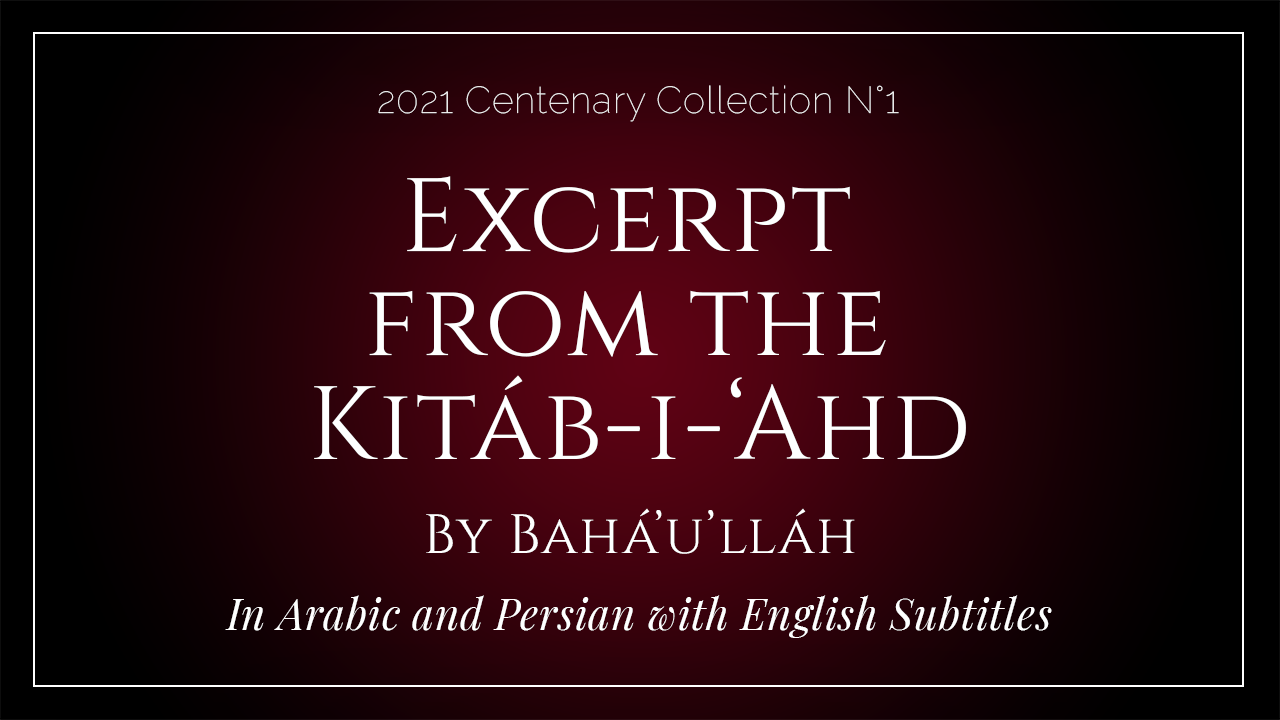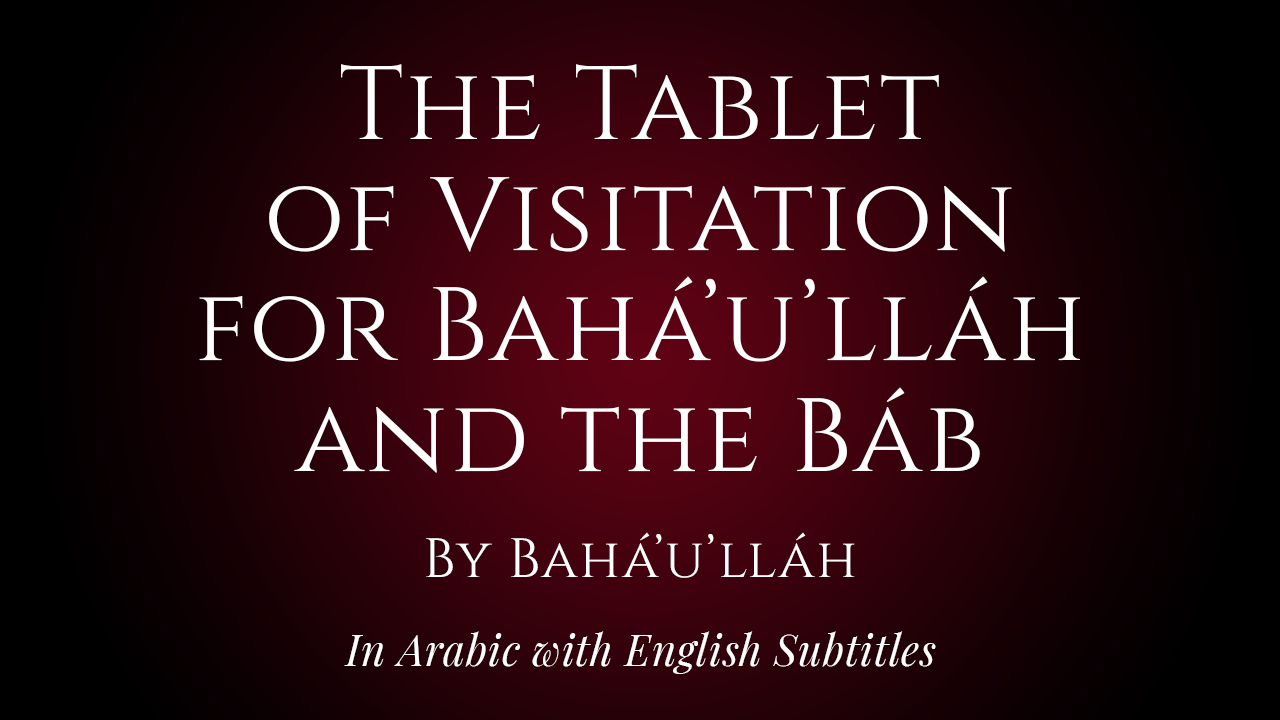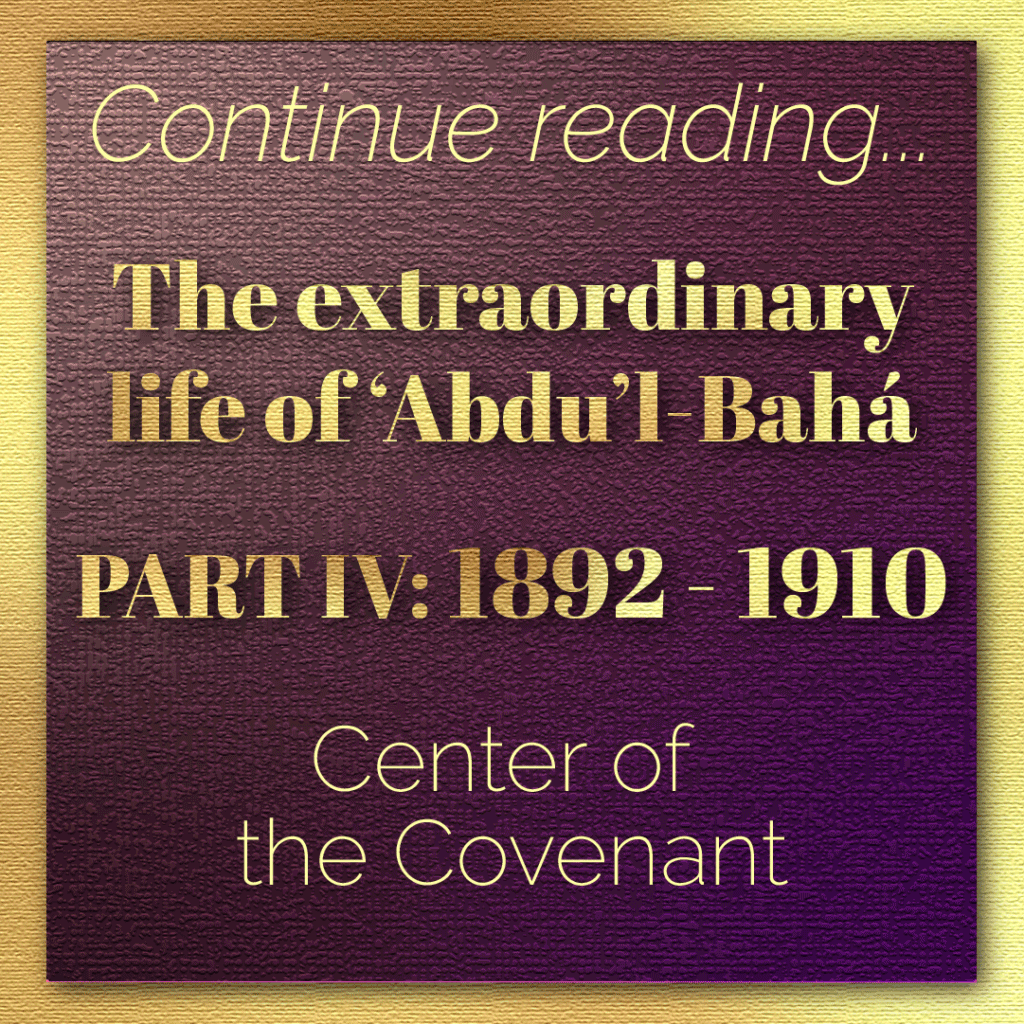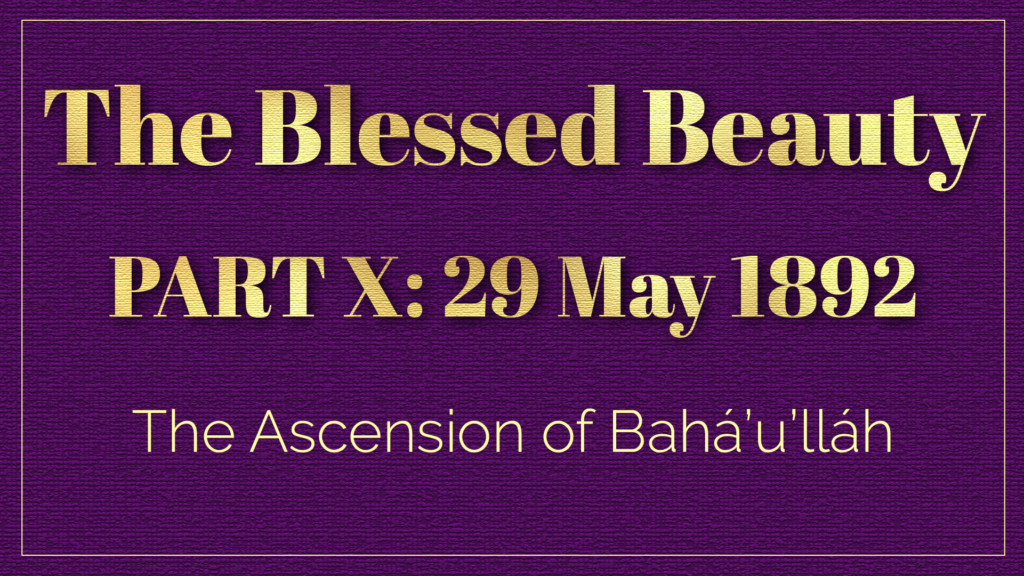
Written and illustrated by Violetta Zein
This part covers the months, weeks, and days before, during, and after the Ascension of Bahá’u’lláh at the age of 75 on 29 May 1892.
“The time cometh, when the nightingale of holiness will no longer unfold the inner mysteries and ye will all be bereft of the celestial melody and of the voice from on high.”
Bahá’u’lláh, The Hidden Words, From the Persian
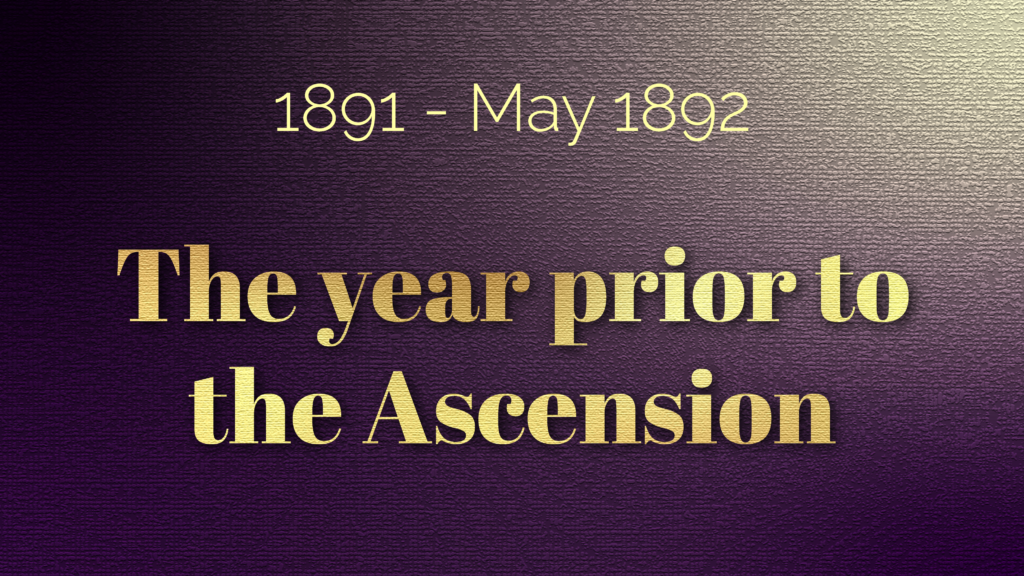
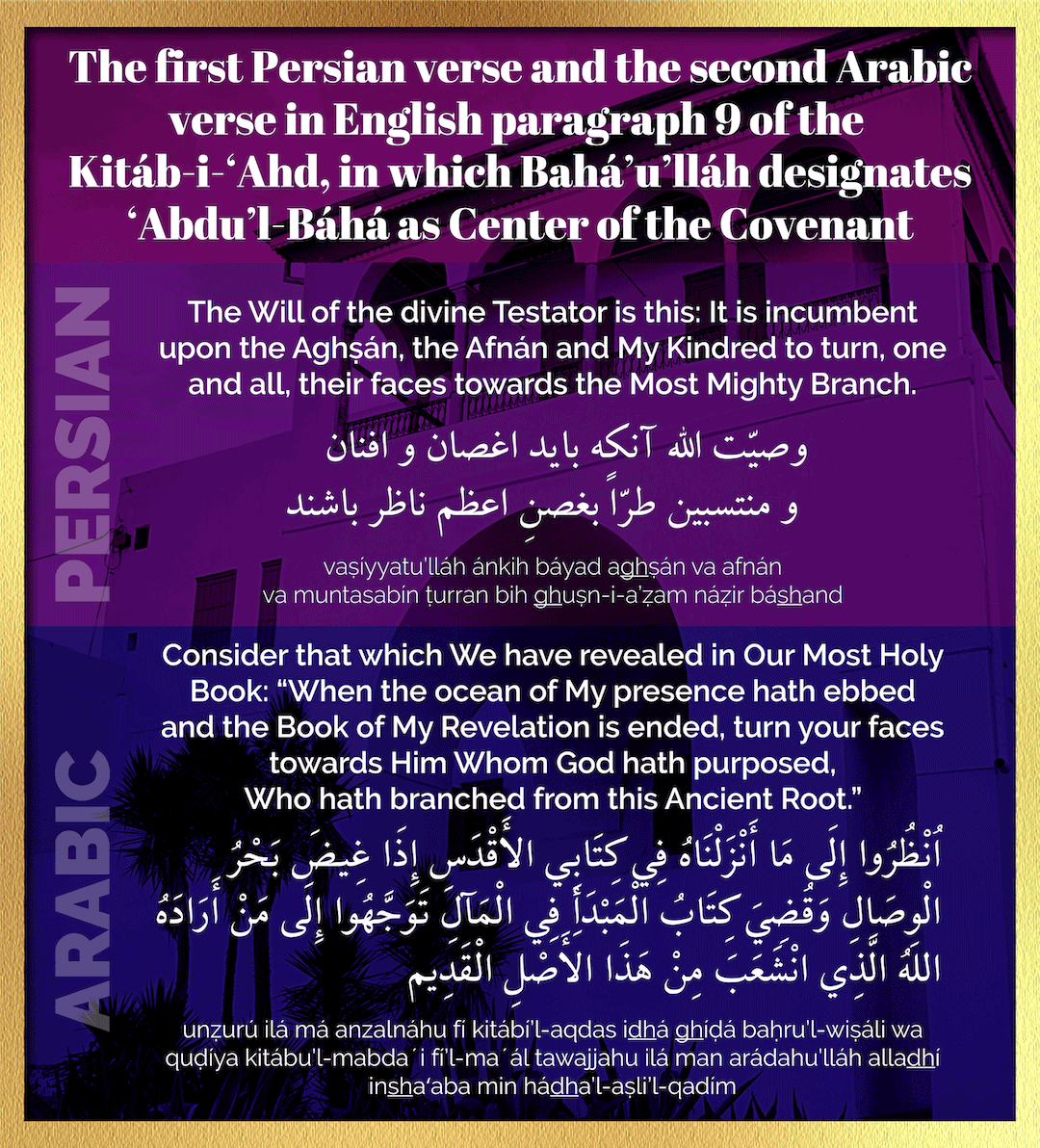
Bahá'u'lláh revealed the Kitáb-i-‘Ahd in mixed Persian and Arabic throughout, sometimes alternating verses in each language, as demonstrated in the graphic above. Both of these verses, the first two in paragraph nine of the English version of the Kitáb-i-‘Ahd. The first verse is in Persian, and the second, quoting from the Arabic Kitáb-i-Aqdas is in that language also. Both verses are the core of Bahá'u'lláh’s Will and Testament, pointing to 'Abdu'l-Bahá as the Center of the Covenant in limpid terms. Background: three-color processed image of the house of ‘Abbúd, where 'Abdu'l-Bahá kept the Kitáb-i-‘Ahd for safekeeping for two months. Source: Bahá'í Media Bank © Bahá'í International Community. Graphic © Violetta Zein.
Approximately a year before His Ascension, Bahá'u'lláh revealed a unique document in the history of religions, His last Will and Testament named the Kitáb-i-‘Ahd (Book of the Covenant) and named by Him the “Crimson Book,” in which He clearly designated 'Abdu'l-Bahá as His successor, the Center of the Covenant and authorized interpreter of His teachings to whom all Bahá'ís should turn after His Ascension.
Because of the growing danger inside the Holy Family, due to Muḥammad ‘Alí’s increasing faithlessness, Bahá'u'lláh kept His Will and Testament secret from everyone and safely in His possession. During His last illness, Bahá'u'lláh gave the Kitáb-i-‘Ahd to 'Abdu'l-Bahá, who kept it for safekeeping in a box in His home in 'Akká.
To listen to an excerpt of Kitáb-i-‘Ahd, recited in Arabic with English subtitles and transliteration, please click here or on the image below:
Partial Inventory ID: BH00003
Bahá'u'lláh, Kitáb-i-‘Ahd.
Adib Taherzadeh, The Covenant of Bahá'u'lláh, Chapter 8: The Arch-breaker of Bahá'u'lláh’s Covenant.
For the eight references to the “Crimson Book,” see search results on Bahá'í Reference Library.
Adib Taherzadeh, The Covenant of Bahá'u'lláh, Chapter 8: The Arch-breaker of Bahá'u'lláh’s Covenant
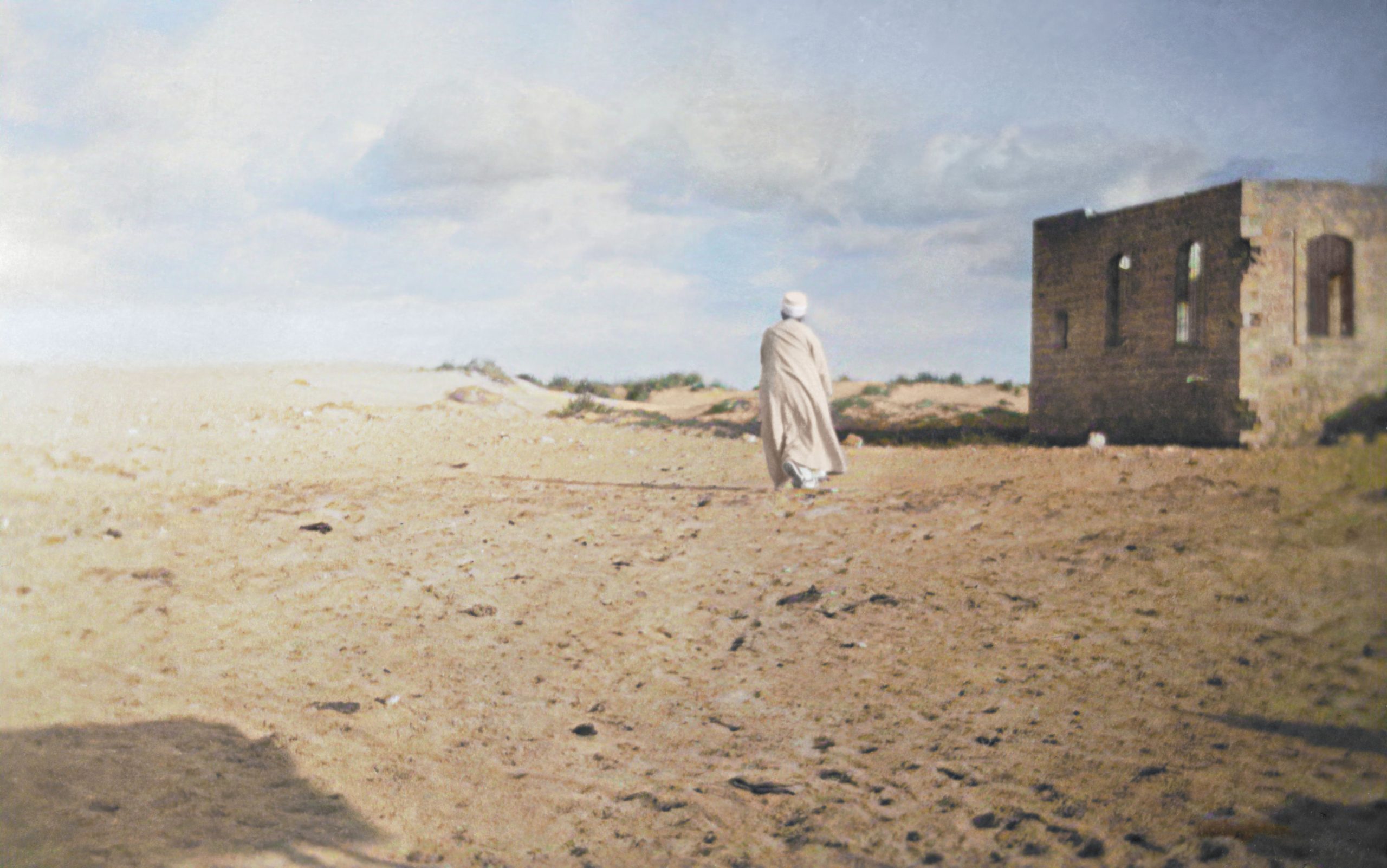
This sublime colorized image of ‘Abdu’l-Bahá in the Holy Land, a year before His passing, when He, too, was arranging His affairs shortly before His Ascension, is a melancholic homage to the end of Bahá'u'lláh’s long life, an end He sometimes spoke of with heartbreaking longing, as would ‘Abdu'l-Bahá, 29 years later. Source: Bahá'í Media Bank © Bahá'í International Community.
In the nine months before His ascension Bahá’u’lláh had already voiced His desire to leave this world, and it became increasingly evident, from that moment forward and from the tone of His utterances to those who entered His presence that the close of His earthly life was approaching, though Bahá'u'lláh refrained from mentioning it openly to anyone, and began arranging His affairs with a sense of urgency.
Shoghi Effendi, God Passes By.
Adib Taherzadeh, The Revelation of Bahá'u'lláh Volume 4: Mazra’ih and Bahjí 1877-1892, page 414.
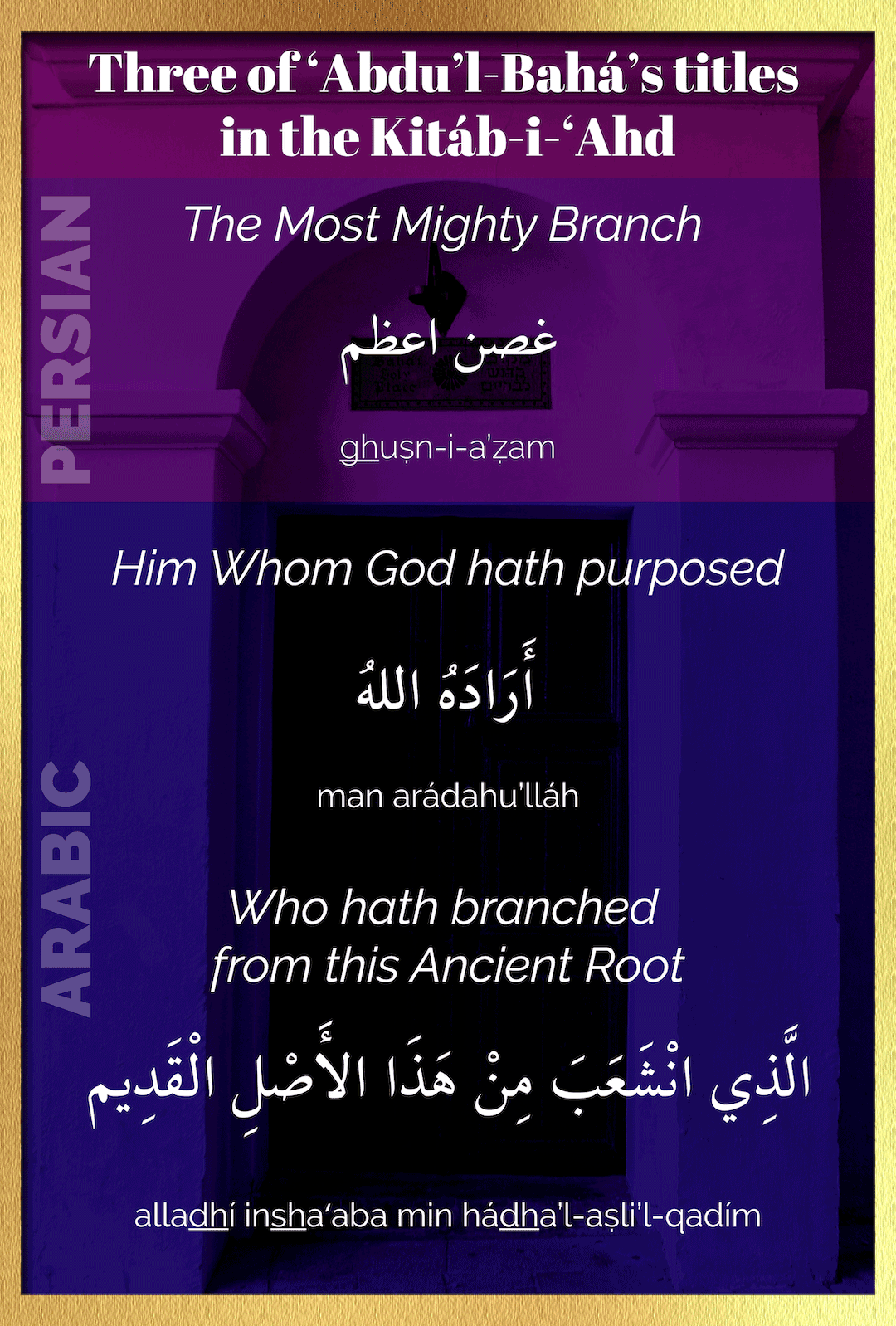
As an homage to 48 years of love between Bahá'u'lláh and 'Abdu'l-Bahá, the three terms which Bahá'u'lláh uses to the refer to 'Abdu'l-Bahá in the first two verses of English paragraph 9 of the Kitáb-i-‘Ahd. The first verse is in Persian, and the other two are in Arabic. Background of the door of the house of ‘Abbúd, where 'Abdu'l-Bahá kept the Kitáb-i-‘Ahd safe. Source: Bahá'í Media Bank © Bahá'í International Community. © Violetta Zein.
Bahá'u'lláh revealed the Kitáb-i-‘Ahd, written entirely in His own hand, and told no one about the precious document, thereby protecting it from the envious and faithless members of His own family, such as His son Muḥammad ‘Alí who, two years prior to Bahá'u'lláh’s Ascension, had tried and failed to remove all mentions of 'Abdu'l-Bahá in the Kitáb-i-Aqdas before it was published in India.
Evidence suggest Bahá'u'lláh had intimated the contents of the Kitáb-i-‘Ahd to 'Abdu'l-Bahá, and forty days before He was first seized with fevers, sometime around 29 March 1892, Bahá'u'lláh entrusted His last Will and Testament to 'Abdu'l-Bahá, who safeguarded it in the house of ‘Abbúd, locked in a box.
Christopher Buck and Youli Ioannesyan, The 1893 Russian Publication of Baha’u’llah’s Last Will and Testament: An Academic Attestation of ‘Abdu’l-Baha’s Successorship, published in 2017 in Baha’i Studies Review Volume 19, page 26.
Shapour Rassekh, Mujmalí darbárih-i-Kitáb-i-'Ahdí, published in Maḥbúb--i-Álám, 'Andalíb, Editorial Board of the National Spiritual Assembly of the Bahá'ís of Canada (1992-1993), pages 534-549.
DATE
Forty days before 8 May 1892: Google AI.
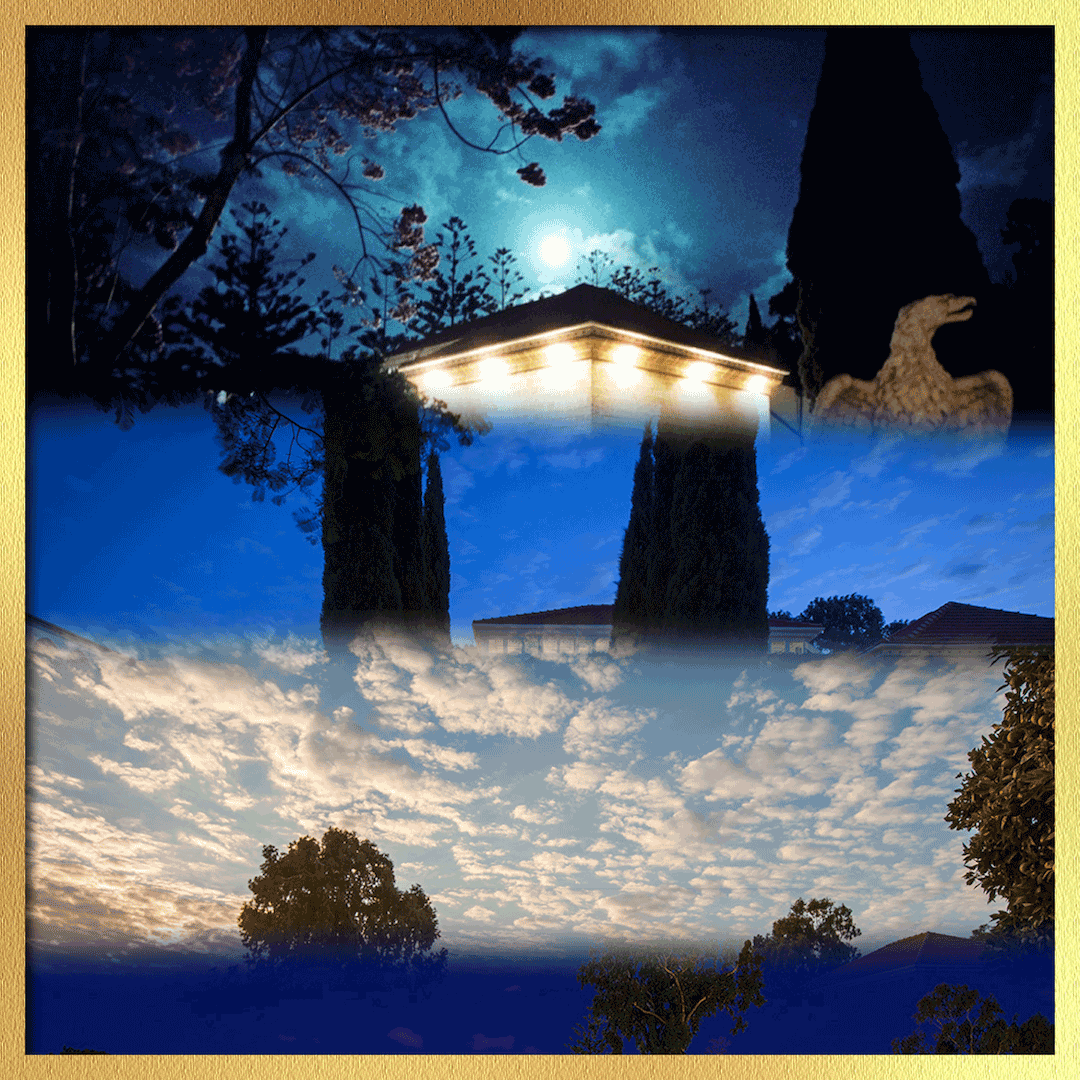
The open skies above Bahjí, where Bahá'u'lláh expressed His longing to flee away from this physical realm. Four photographs for the four glorious decades of Bahá'u'lláh’s ministry, from dawn to early morning, and dusk to dark night, with the eagle placed by Shoghi Effendi as an homage to the wings of flight. Sources for each photograph linked in the description. Bahá'í Media Bank photographs © Bahá'í International Community.
Sometime in the closing days of His Beloved Father’s life, 'Abdu'l-Bahá was gathering together Bahá'u'lláh’s papers, strewn on the divan of His writing chamber in Bahjí, when Bahá'u'lláh turned to Him and said: ”It is of no use to gather them, I must leave them and flee away.”
Shoghi Effendi, God Passes By.
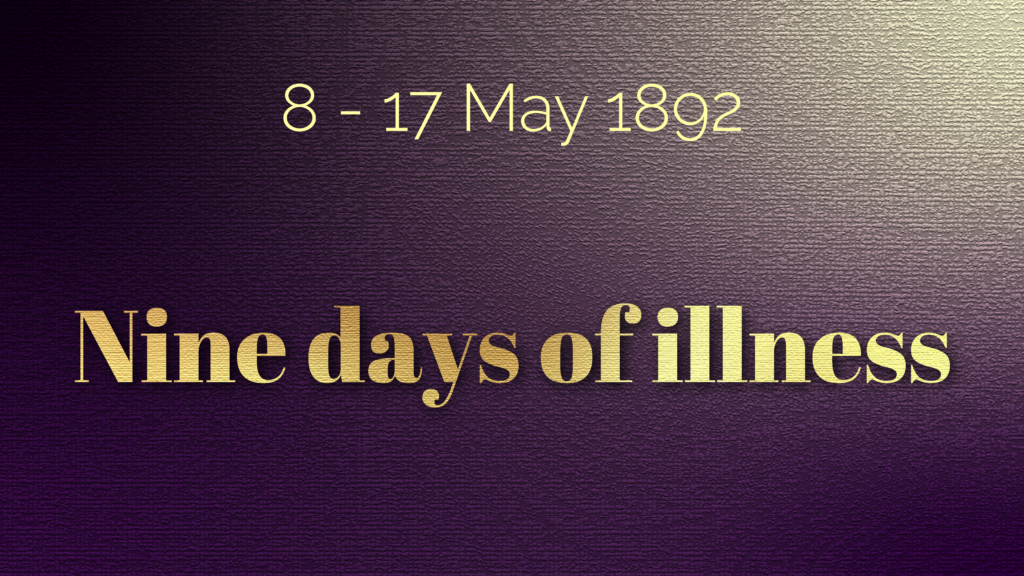
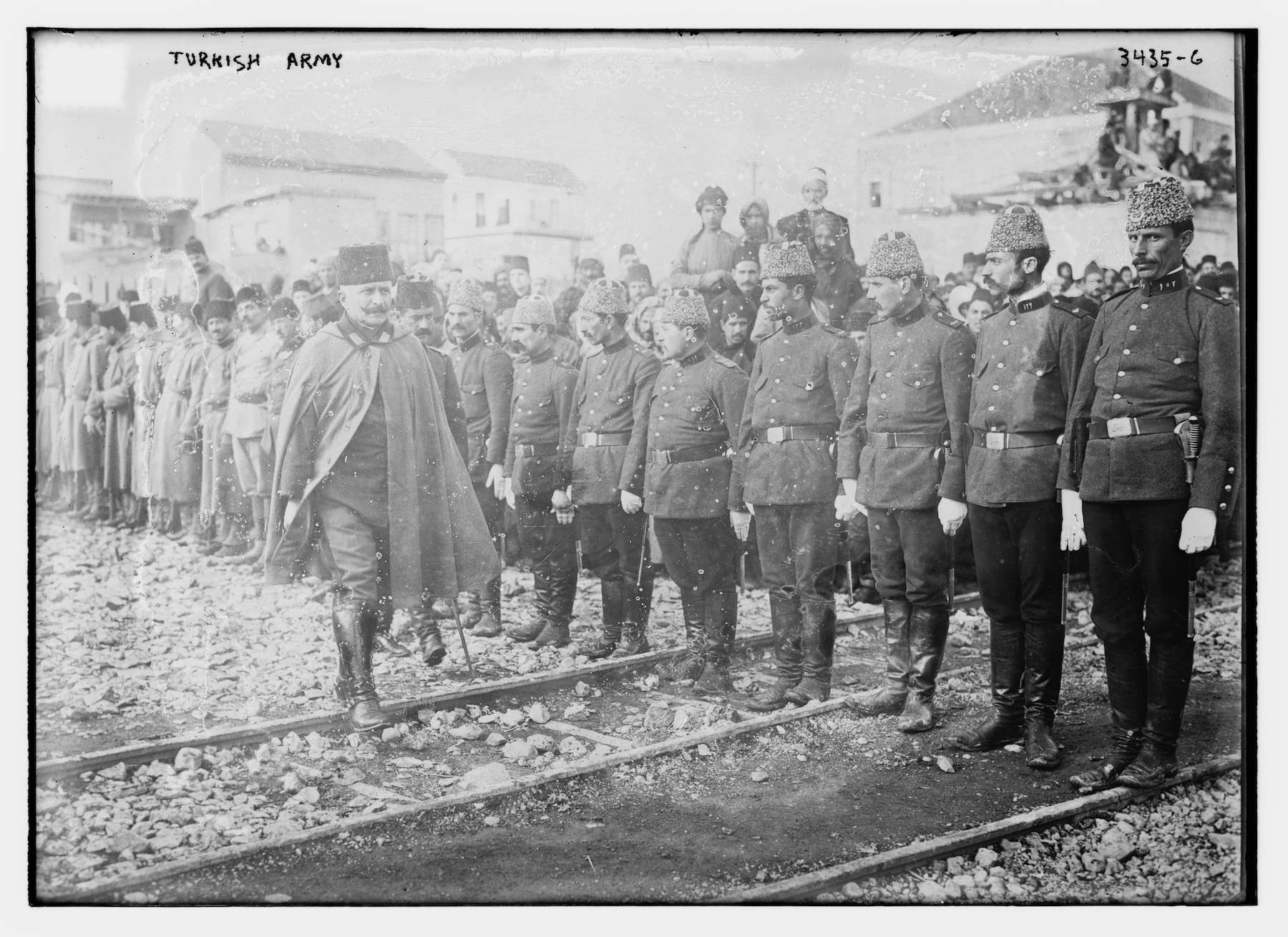
The day Bahá'u'lláh suffered His first fever, one thousand Palestinians from the countryside of Bahjí were forcibly conscripted and held not far from the Mansion of Bahjí. Source: Library of Congress.
On Sunday 8 May 1892, the Ottoman Government rounded up one thousand farmers, gave them military uniforms, and held them against their will as conscripts, to be sent for training in far-off lands in a few days’ time. The tents where the involuntary conscripts were held was close to the grounds of the Mansion of Bahjí and their heartbreaking cries, and the lamentation of their families could be heard day and night.
In the evening of that same day, 50 days after Naw-Rúz, Bahá'u'lláh contracted a fever, but did not mention it to anyone.
Adib Taherzadeh, The Revelation of Bahá'u'lláh Volume 4: Mazra’ih and Bahjí 1877-1892, page 414.
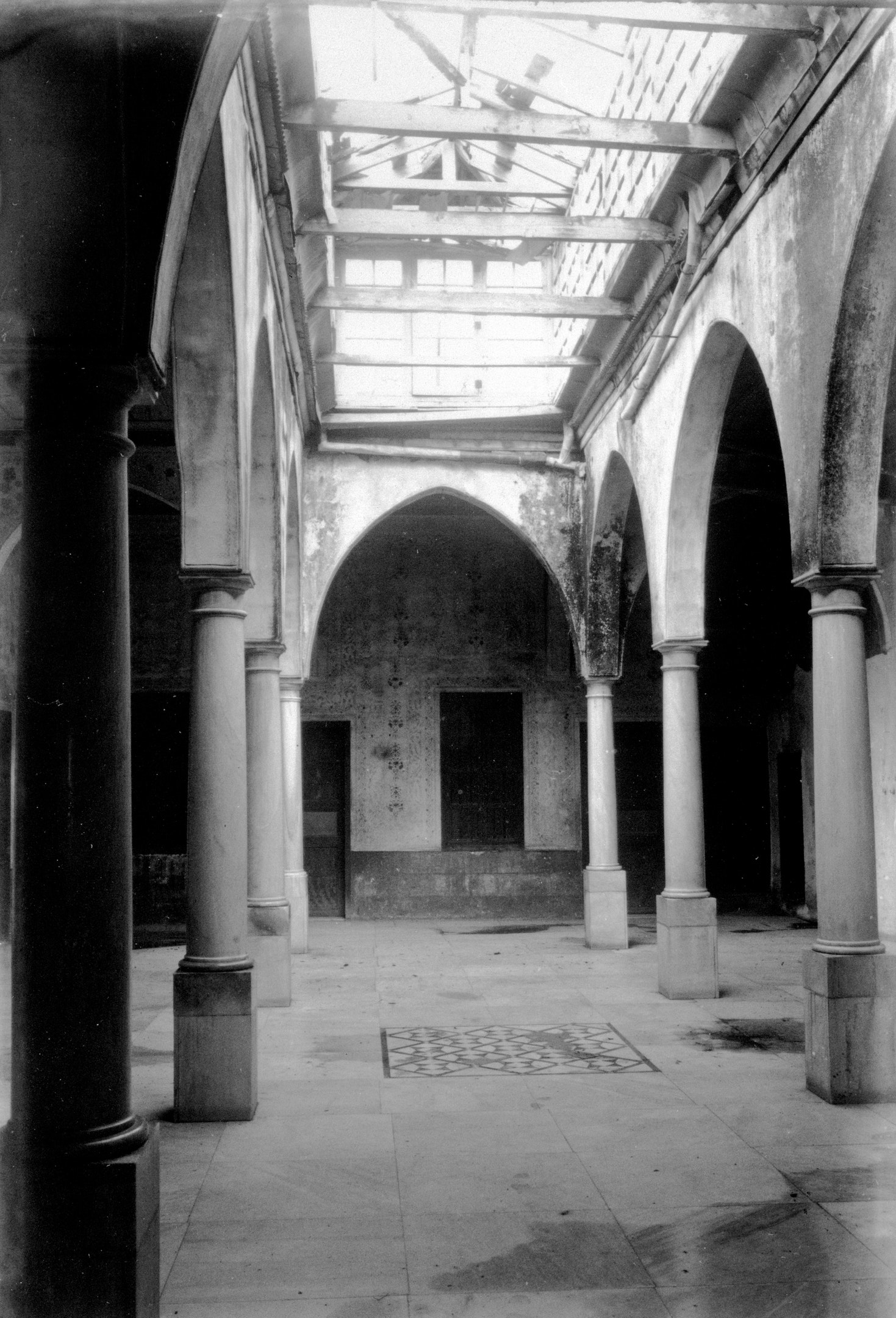
The main hall in Bahjí in 1929, before Shoghi Effendi began restorations on the Mansion, and perhaps a hall through which Bahá'u'lláh’s only visitor on Monday 9 May passed through on his way to enter His presence. Source: Bahá'í Media Bank © Bahá'í International Community.
On the following morning of Monday 9 May 1892, a number of the friends attained the presence of Bahá'u'lláh, and by late afternoon, His fever had intensified. That evening, Bahá'u'lláh only admitted one believer in His presence who had an urgent demand.
Adib Taherzadeh, The Revelation of Bahá'u'lláh Volume 4: Mazra’ih and Bahjí 1877-1892, page 414.
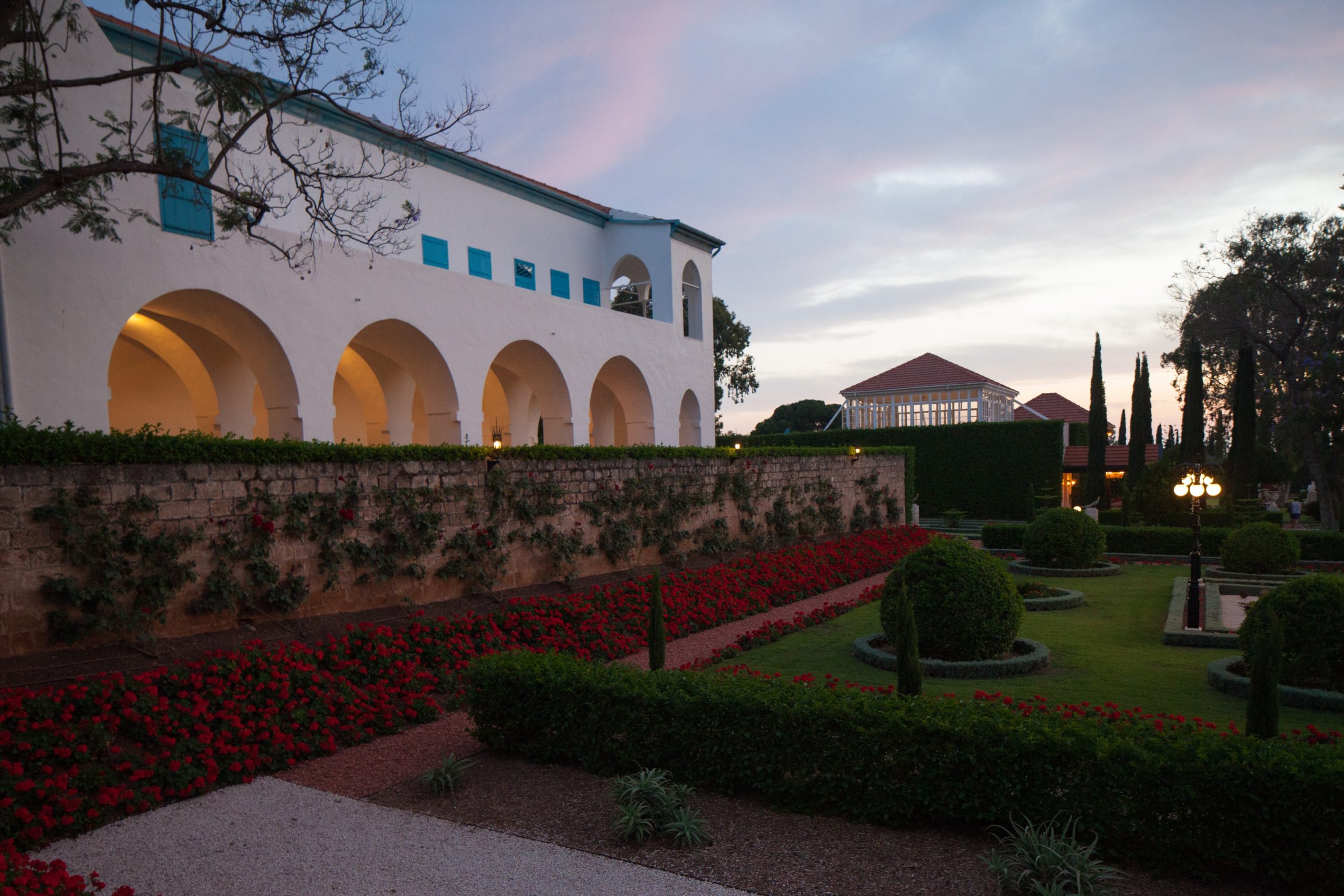
The Mansion of Bahjí at sunset, the time until which Bahá'u'lláh received visitors on 10 May 1892. Source: Bahá'í Media Bank © Bahá'í International Community.
At noon on Tuesday 10 May 1892, Bahá'u'lláh summoned Nabíl to His presence and spoke to him for half an hour, at times seated, and at times pacing His room, vouchsafing on His loyal and devoted follower infinite bounties. In the afternoon, Ḥájí Níyáz, a well-known believer, arrived from Egypt and entered the presence of Bahá'u'lláh with several friends. Bahá'u'lláh continued to allow visitors until sunset.
Adib Taherzadeh, The Revelation of Bahá'u'lláh Volume 4: Mazra’ih and Bahjí 1877-1892, page 414.
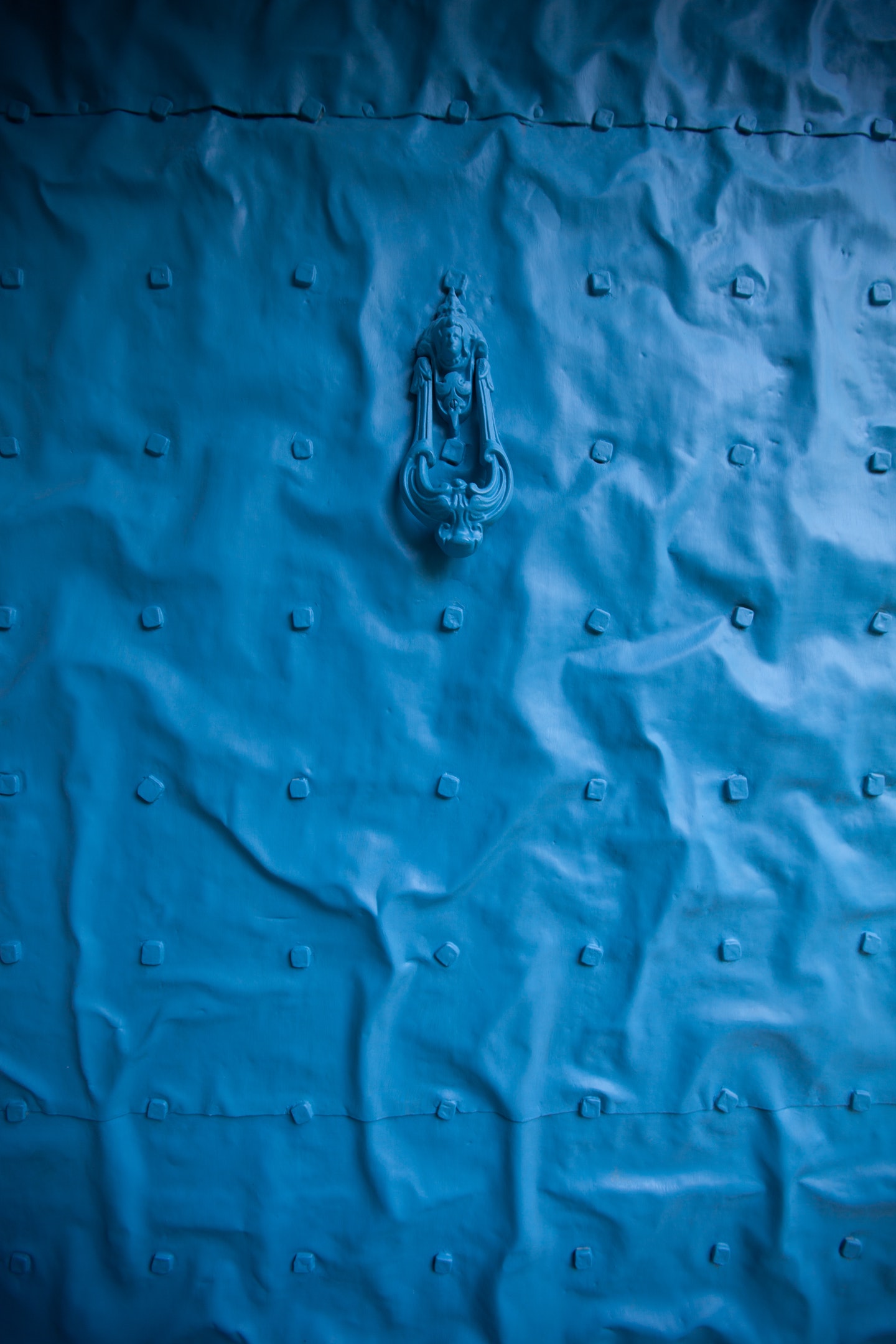
On Wednesday 11 May 1892, three days after His first fever, Bahá'u'lláh did not allow believers to enter His presence. A detail from the closed door of the Mansion to illustrate the closing of “the door of union” with the Blessed Beauty. Source: Bahá'í Media Bank © Bahá'í International Community.
The following day, Bahá'u'lláh did not allow anyone to enter His presence and an atmosphere of gloom descended on the believers, deprived of their Beloved.
Adib Taherzadeh, The Revelation of Bahá'u'lláh Volume 4: Mazra’ih and Bahjí 1877-1892, page 414.
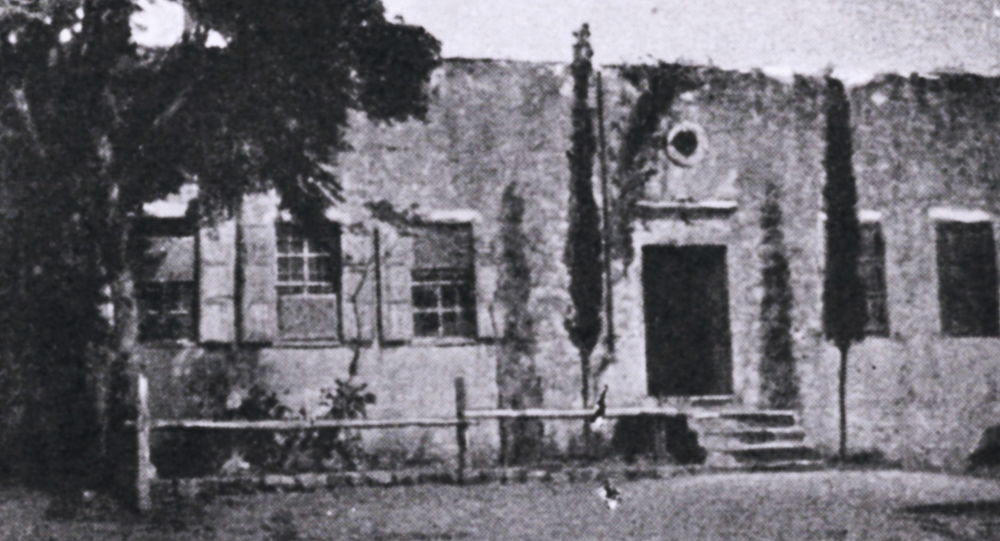
The Pilgrim House at Bahjí in 1926, photograph from (Star of the West [The Baha'i Magazine], vol. 17, no. 8, November 1926). Source: Baha'i Historical Facts.
For several days, Bahá'u'lláh continued to close the door of His presence until Monday 16 May 1892, when 'Abdu'l-Bahá left Bahá'u'lláh’s presence and delivered a message from Him to the believers: “All the friends must remain patient and steadfast, and arise for the promotion of the Cause of God. They should not become perturbed, because I shall always be with them, and will remember and care for them.” Bahá'u'lláh’s words broke the believers’ hearts. They cried out, grieving, from the tone of 'Abdu'l-Bahá’s remarks, clearly indicating the end of Bahá'u'lláh’s life was at hand, and the realization threw the believers in an extreme state of turmoil and dismay.
Adib Taherzadeh, The Revelation of Bahá'u'lláh Volume 4: Mazra’ih and Bahjí 1877-1892, pages 413-421.
Lady Blomfield The Chosen Highway.
Shoghi Effendi, God Passes By.
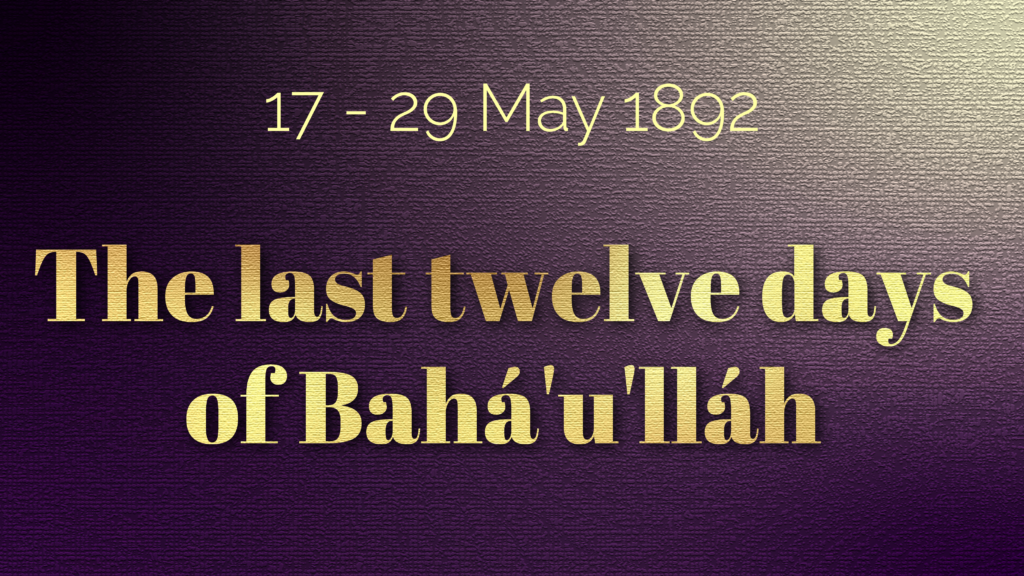
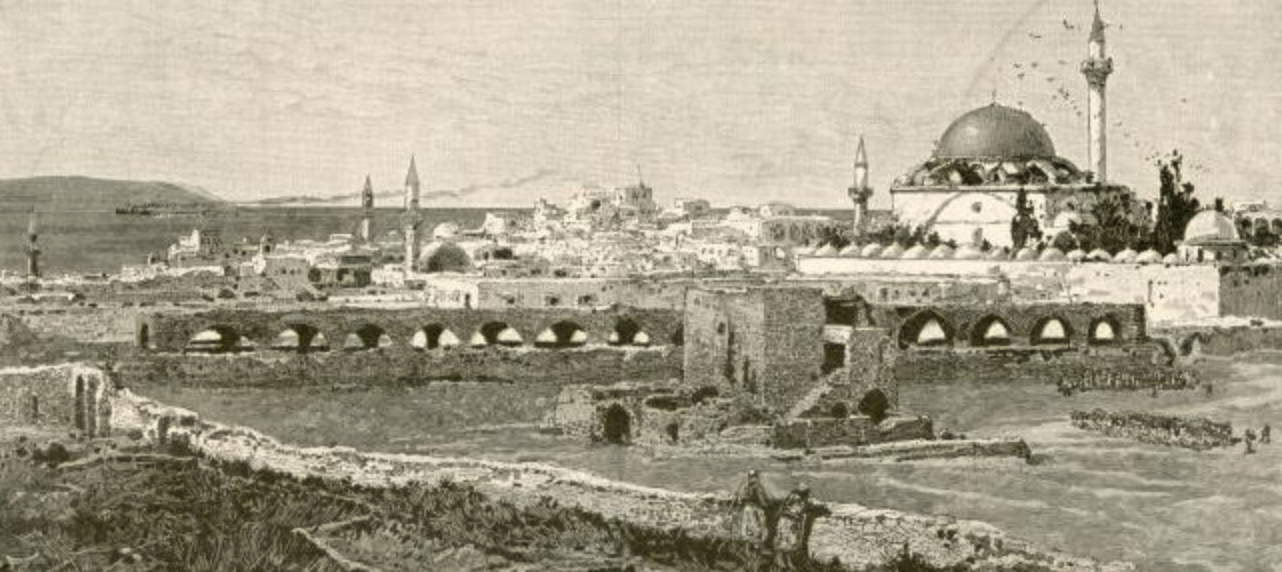
View of 'Akká, where 'Abdu'l-Bahá visited the homes of each Bahá'í with joyful news. The Mosque of Al-Jazzár is in the foreground. A steamer in the background is approaching Haifa. Photographer: Harry Fenn. Dorot Jewish Division. Source: The New York Public Library Digital Collections.
A day of sorrow gave way to a day of joy. The next day, Tuesday 17 May 1892, 'Abdu'l-Bahá arrived at the Pilgrim House at dawn, and gave everyone the happy news that Bahá'u'lláh’s condition had greatly improved. 'Abdu'l-Bahá awoke the friends one by one, bade them arise, drink their morning tea with the utmost joy, and offer thanksgiving to God for Bahá'u'lláh’s good health. The news turned the day into a festival of happiness, and believers and the people of 'Akká all congratulated each other.
Later that same morning, Sulṭán Abdu’l-Ḥamíd sent a telegram from Constantinople, ordering the release of the 1,000 involuntary conscripts, and everyone was filled with joy. 'Abdu'l-Bahá distributed food among the conscripts, the poor, the orphans and the prisoners of 'Akká. None of the inhabitants of 'Akká could remember a happier day, and they offered gratitude to Bahá'u'lláh for His bounties.
'Abdu'l-Bahá also visited the home of every Bahá'í in 'Akká and conveyed to everyone, man and woman the loving greetings of Bahá'u'lláh.
Taherzadeh, Adib. The Revelation of Bahá’u’lláh, Volume 4 (Mazra‘ih & Bahjí, 1877–1892) pages 415-416.
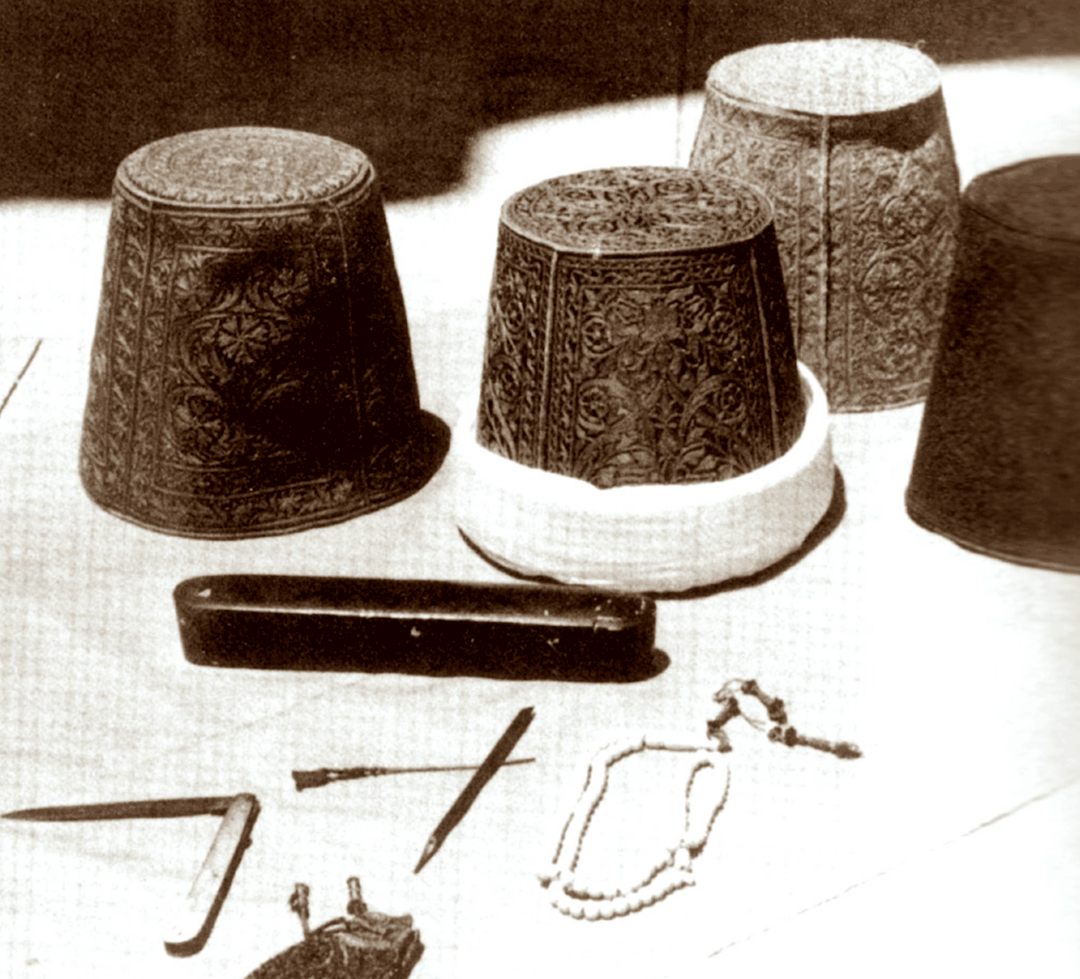
Some relics of Bahá'u'lláh, to illustrate a story relating to His belongings, later stolen by the Covenant-breakers. Source: Bahá'í Sacred Relics.
'Abdu'l-Bahá stayed with Bahá'u'lláh night and day during His illness, in a state of deep sorrow. One day, as He laid in bed, Bahá'u'lláh instructed 'Abdu'l-Bahá to gather all His papers and place them in two cases. The finality of what Bahá'u'lláh had asked shook 'Abdu'l-Bahá to His core, and hesitated to comply, but Bahá'u'lláh insisted. As He was gathering Bahá'u'lláh’s papers with trembling hands and tearful eyes, 'Abdu'l-Bahá saw Mírzá Maju'd Dín, the future Covenant-breaking son of Mírzá Músá, and asked for his help to finish the heartbreaking task. When Bahá'u'lláh’s papers, seals and other items were locked into the cases, Bahá'u'lláh said to 'Abdu'l-Bahá: “These two now belong to you.” Bahá'u'lláh’s words implied His approaching Ascension and pierced 'Abdu'l-Bahá’s heart like an arrow.
Adib Taherzadeh. The Covenant of Bahá’u’lláh, page 148.
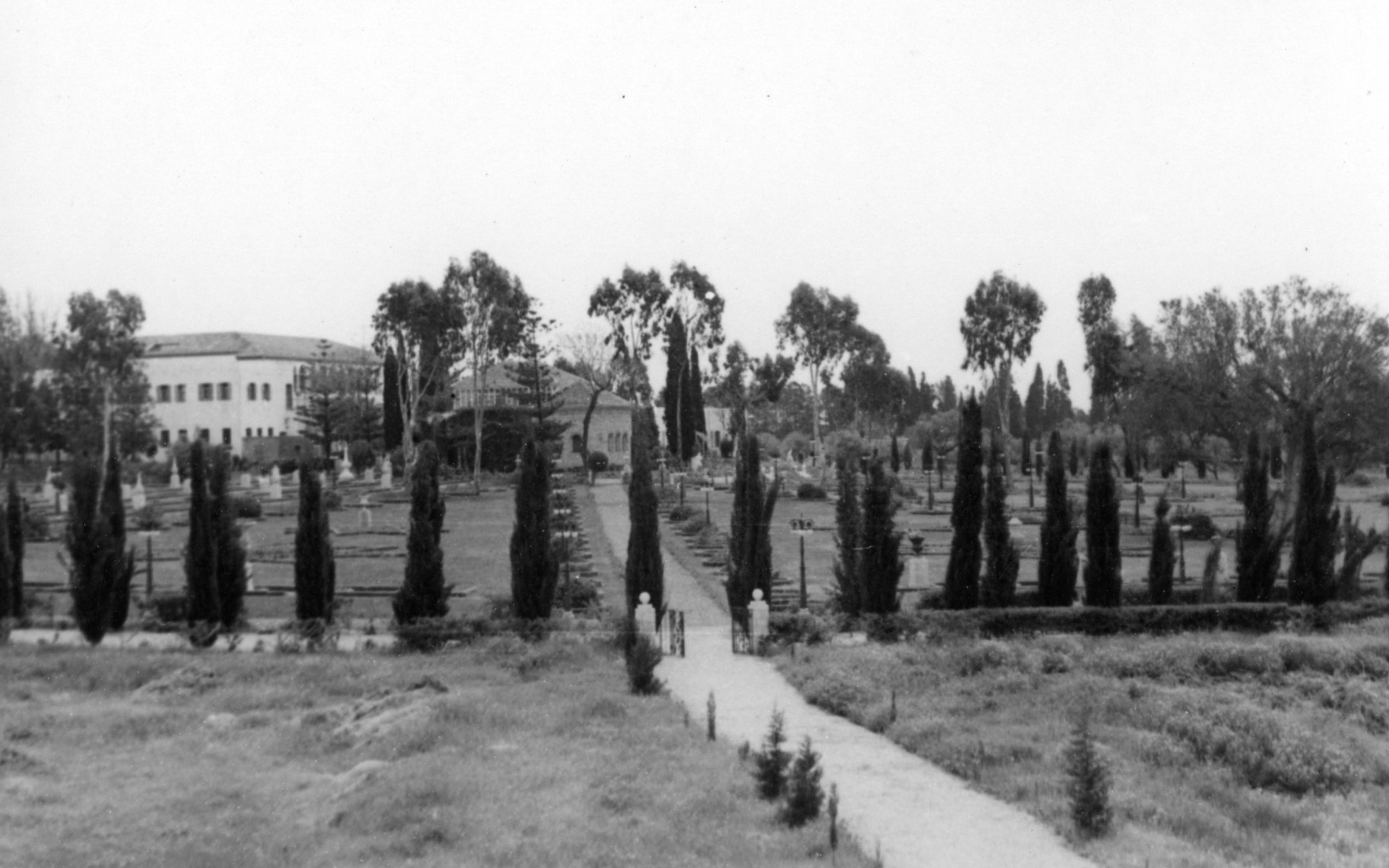
View of the Mansion of Bahjí taken between 1956 – 1958 as indicated by the size of the Cypress trees (planted in 1952) and by the fact that the Covenant-breakers' house next to the Mansion has yet to be demolished (which occurred in December 1958). Detailed caption provided by Andrew Blake. Bahá'í Media Bank.
Five days before the Holy Family bids farewell to Bahá'u'lláh in the Mansion of Bahjí, Bahá'u'lláh sent a servant from Bahjí to the house of ‘Abbúd with a worrisome message for 'Abdu'l-Bahá: “I am not well, come to Me and bring Khánum.” 'Abdu'l-Bahá and Bahíyyih Khánum left for Bahjí immediately while Munírih Khánum stayed at home with the children, filled with anxiety.
Lady Blomfield, The Chosen Highway, pages 105-107.
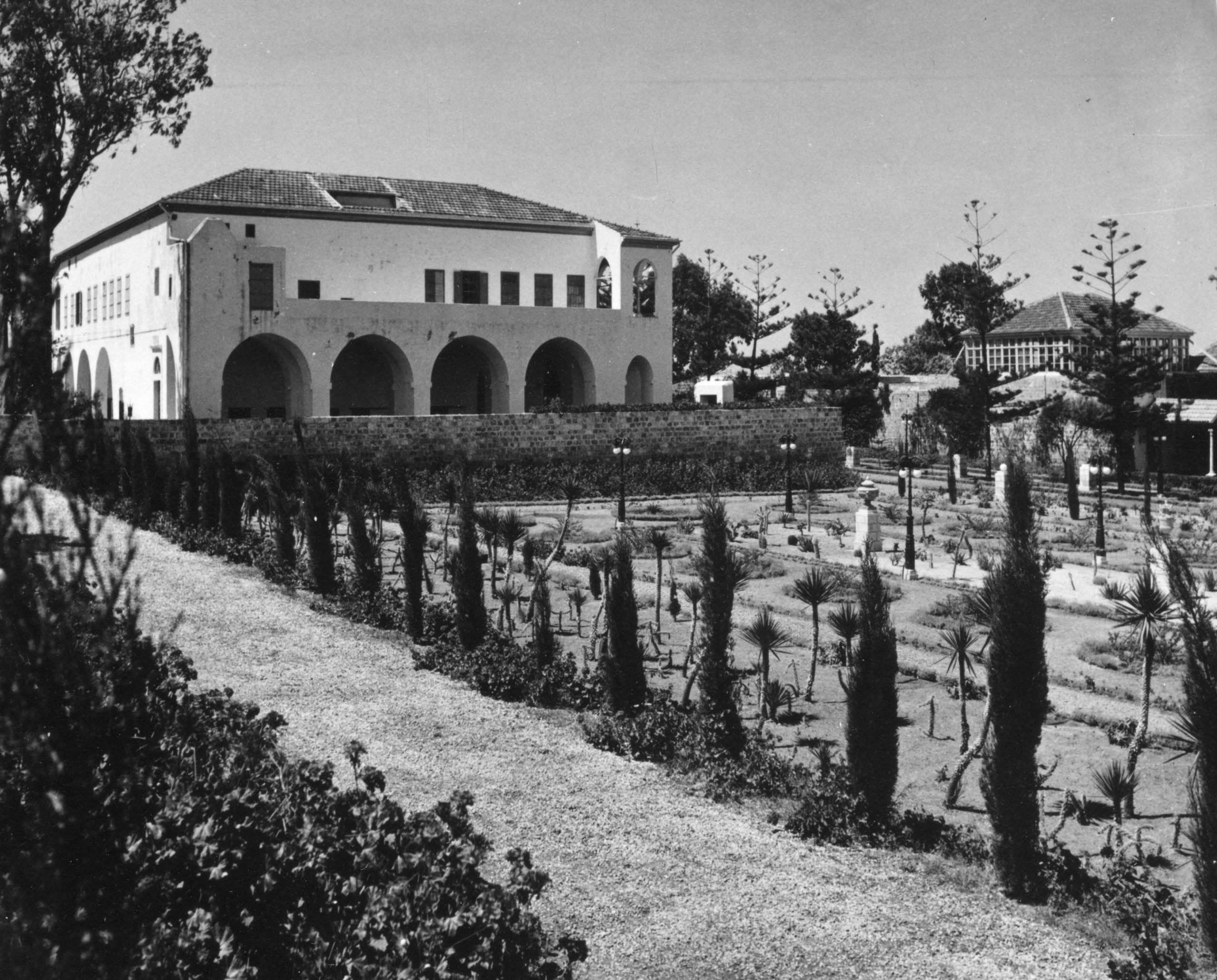
Approach to the Mansion of Bahjí, where all the believers attained the presence of Bahá'u'lláh for the last time on 22 May 1892, seven days before His Ascension. Source: Bahá'í Media Bank. © Bahá'í International Community.
On Sunday 22 May 1892, all the believers present at the Mansion of Bahjí, pilgrims and residents alike, were summoned to Bahá'u'lláh’s presence. The entire body of believers, weeping and grief-stricken, attained His presence as Bahá'u'lláh lay in bed leaning against one of His sons. Bahá'u'lláh gently and affectionally addressed them, saying: “I am well pleased with you all, you have rendered many services, and been very assiduous in your labours. You have come here every morning and evening. May God assist you to remain united. May He aid you to exalt the Cause of the Lord of being.”
Jináb-i-Mírzá Ismá’íl could not stop weeping, and Bahá'u'lláh beckoned him forward, wiping his tears from his cheeks using His own handkerchief.
Shoghi Effendi, God Passes By.
Adib Taherzadeh, The Revelation of Bahá'u'lláh Volume 4: Mazra’ih and Bahjí 1877-1892, pages 416-417.
Lady Blomfield, The Chosen Highway.
'Alí-Akbar Furútan, Stories of Bahá'u'lláh, page 109.
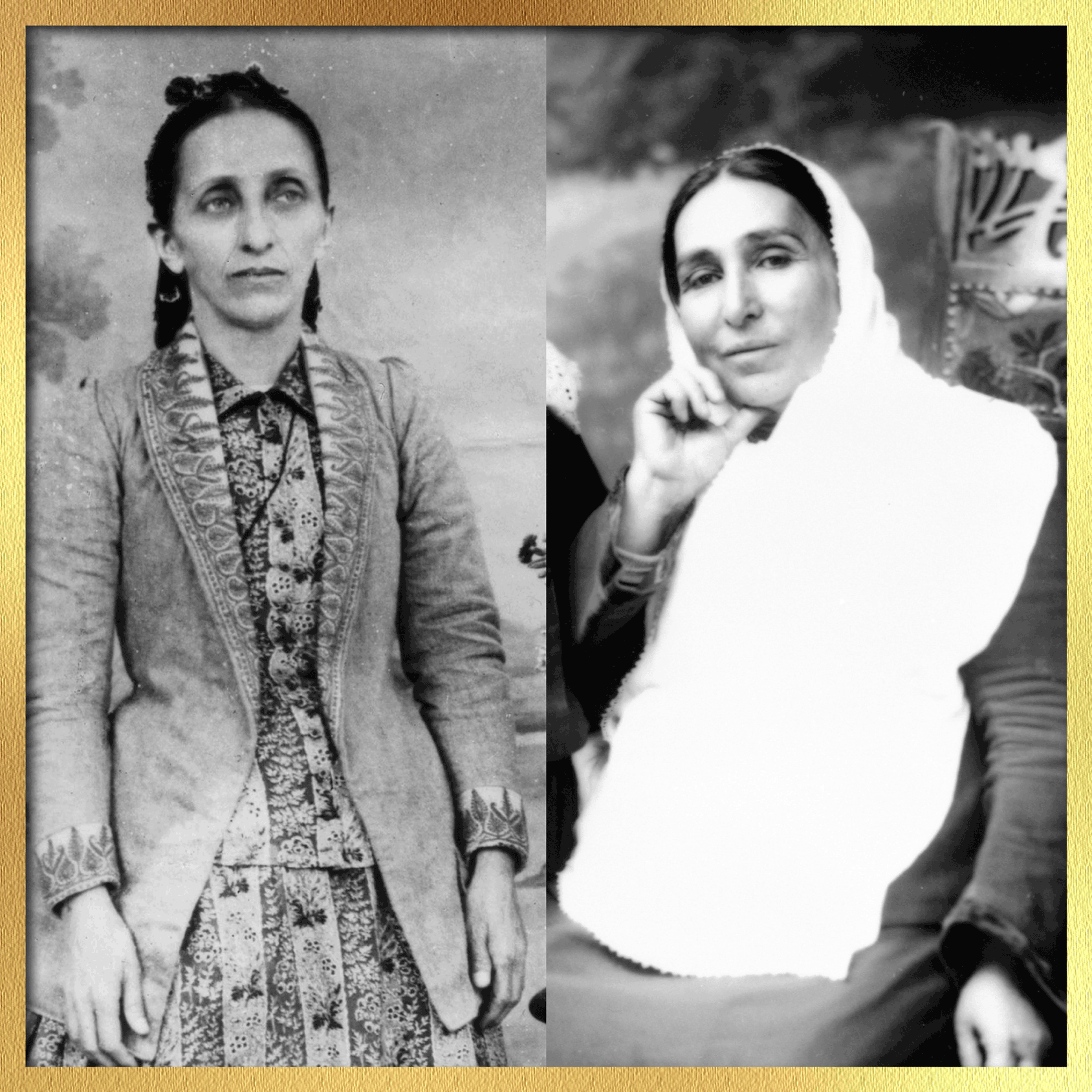
Two of the women of the Holy Family who were most certainly in Bahá'u'lláh’s presence on 22 May 1892, when He addressed them His last words of comfort. Bahíyyih Khánum on the left, the Great Holy Leaf, and Munírih Khánum, Holy Mother, on the right. Source: Bahá'í Media Bank © Bahá'í International Community.
That same day, Bahá'u'lláh addressed Himself to the women of the Holy Family gathered around His bedside, offering them words of comfort and assuring them that He had entrusted them to the care of 'Abdu'l-Bahá in a special document.
Shoghi Effendi, God Passes By.
Adib Taherzadeh, The Revelation of Bahá'u'lláh Volume 4: Mazra’ih and Bahjí 1877-1892, page 419.
Lady Blomfield The Chosen Highway.
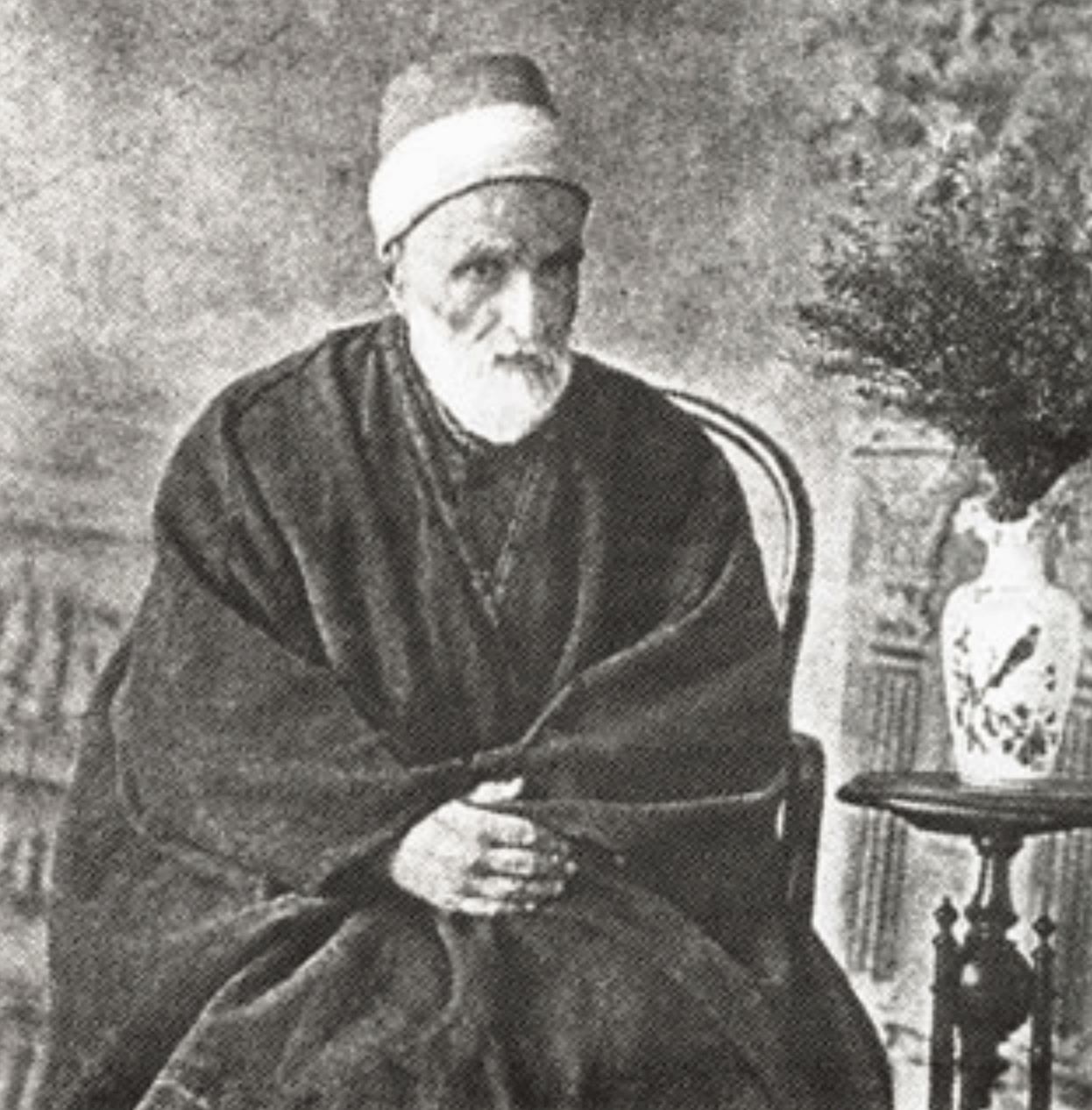
Mírzá Áqá Ján, who destroyed forty years of service as Bahá'u'lláh’s amanuensis, and the bounty of witnessing four decades of His stupendous Revelation first hand, with his ego, mere days before Bahá'u'lláh’s Ascension. Source: Wikimedia Commons.
Mírzá Áqá Ján had been Bahá'u'lláh’s amanuensis for forty years, the entirety of His ministry save for the few months before they met in Baghdád in 1853, serving Bahá'u'lláh with great zeal and enthusiasm, but not much humility. His arrogance increased with time, and towards the end of Bahá'u'lláh’s life, His shortcomings had caused Bahá'u'lláh great sadness. A man who had witnessed Bahá'u'lláh’s most stupendous Revelation for four decades fell from grace in the most shameful way. 'Abdu'l-Bahá rebuked him for his conduct several times.
Soon before Bahá'u'lláh’s Ascension, Ḥájí Mírzá 'Abdu'lláh, the father-in-law of the martyred Varqá, asked Bahá'u'lláh about the Tablets He had revealed in Mírzá Áqá Ján’s voice, and Bahá'u'lláh directed him to get the answer from Mírzá Áqá Ján himself. When Mírzá Áqá Ján was hesitant and slow to answer, some of the believers rose against him.
Soon after, Mírzá Áqá Ján spoke arrogantly to Bahá'u'lláh, causing Him grave displeasure. 'Abdu'l-Bahá found believers arguing with each other, one group led by Nabíl, and the other one by Fúrúghíyyih, one of Bahá'u'lláh’s daughters who later became a Covenant-breaker. 'Abdu'l-Bahá put an end to their argument at once and rebuked them for creating an unnecessary division at such a critical time. 'Abdu'l-Bahá then confronted Mírzá Áqá Ján and reprimanded him for his offensive behaviour, later entering Bahá'u'lláh’s presence three separate times to intercede for Mírzá Áqá Ján’s forgiveness.
Adib Taherzadeh, The Revelation of Bahá'u'lláh Volume 1: Baghdád 1853 - 1863, pages 40-42.
“The Sun of Bahá has set.’”
Bahá’u’lláh, The Hidden Words, From the Persian
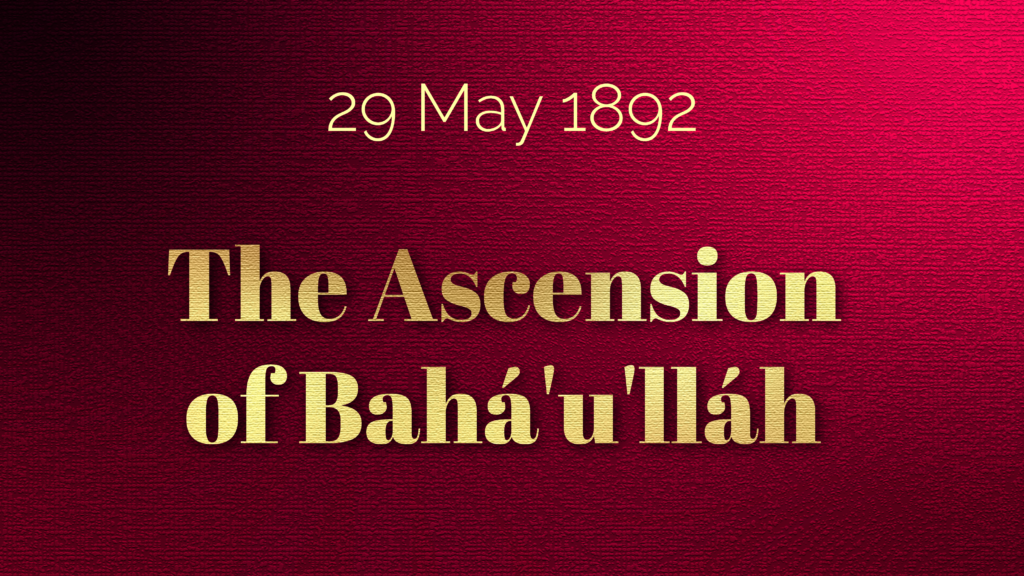
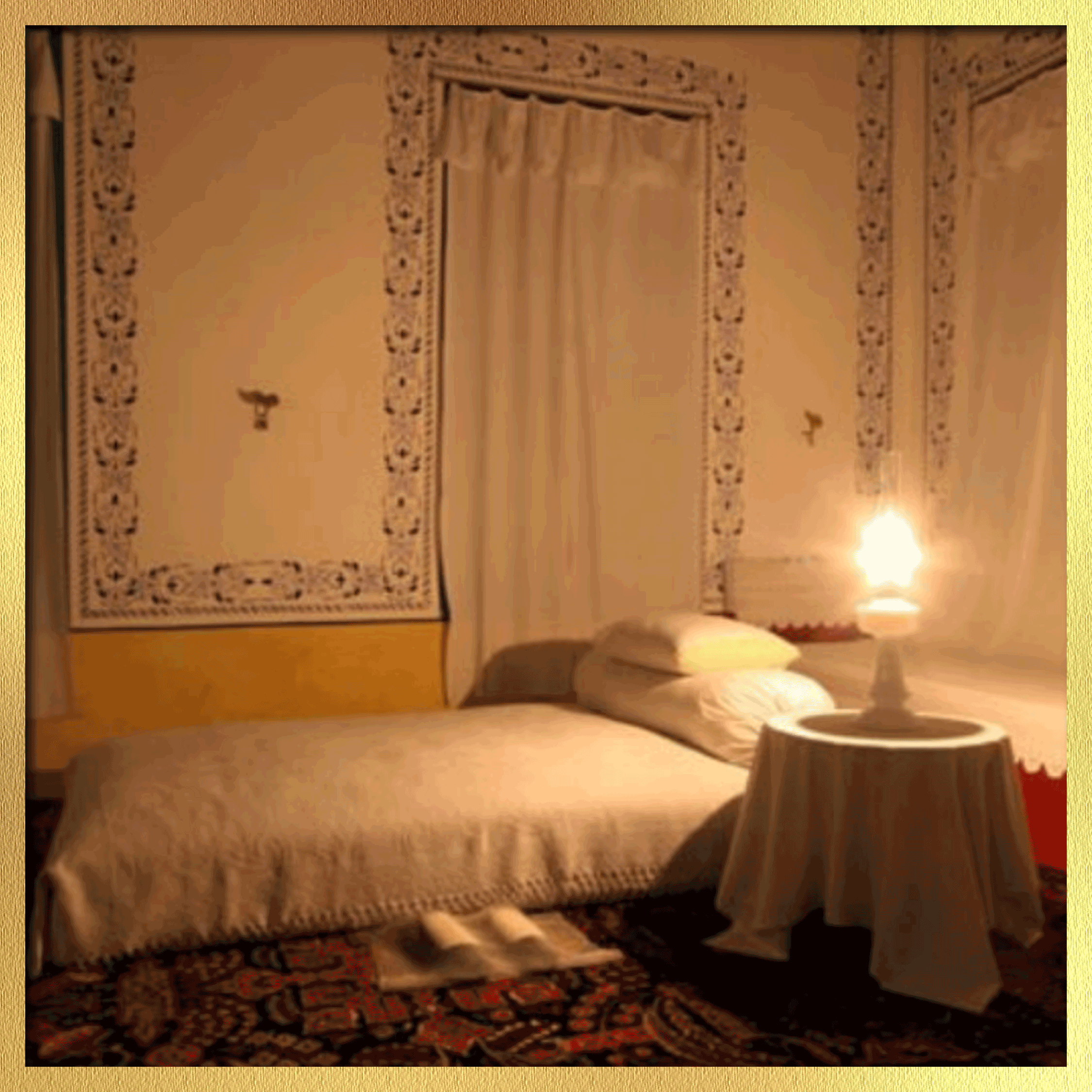
The very room in which Bahá'u'lláh’s Ascension took place, at 3 in the morning on 29 May 1892. Source: Bahá'ís of the United States.
Eight hours after sunset, in the early morning of Saturday 29 May 1892, Bahá'u'lláh passed away at the age of 75, at three o’clock in the morning in His bed chamber at the Mansion of Bahjí, with no sign of the fever that had ebbed and flowed for nearly three weeks. His spirit had winged its flight to “other dominions” where “the eyes of the people of names had never fallen.”
A horseman was immediately dispatched to 'Akká to carry the news to the Muftí, and the seven minarets of the Mosque of Al-Jazzár called out the customary proclamation, only issued in the event of the death of greatly honored, highly learned and holy men: “God is great! He giveth life! He taketh it again! He dieth not, but liveth for evermore!”
Unlike the tragedy of the Bábí community after the martyrdom of the Báb, the Bahá'í community would never suffer one second of confusion and lack of leadership. The cloud of hopelessness and despair that briefly settled over the community of believers were soon lifted. Bahá'u'lláh had ensured the continuity of His infallible guidance, conferred upon 'Abdu'l-Bahá, and the community recognized in Him its Guide, Solace, and Champion. The Ascension of Bahá'u'lláh had ushered in “the Day which shall not be followed by night.”
Shoghi Effendi. God Passes By.
Adib Taherzadeh, The Revelation of Bahá'u'lláh Volume 4: Mazra’ih and Bahjí 1877-1892, page 417.
Lady Blomfield The Chosen Highway.
Shoghi Effendi, God Passes By.
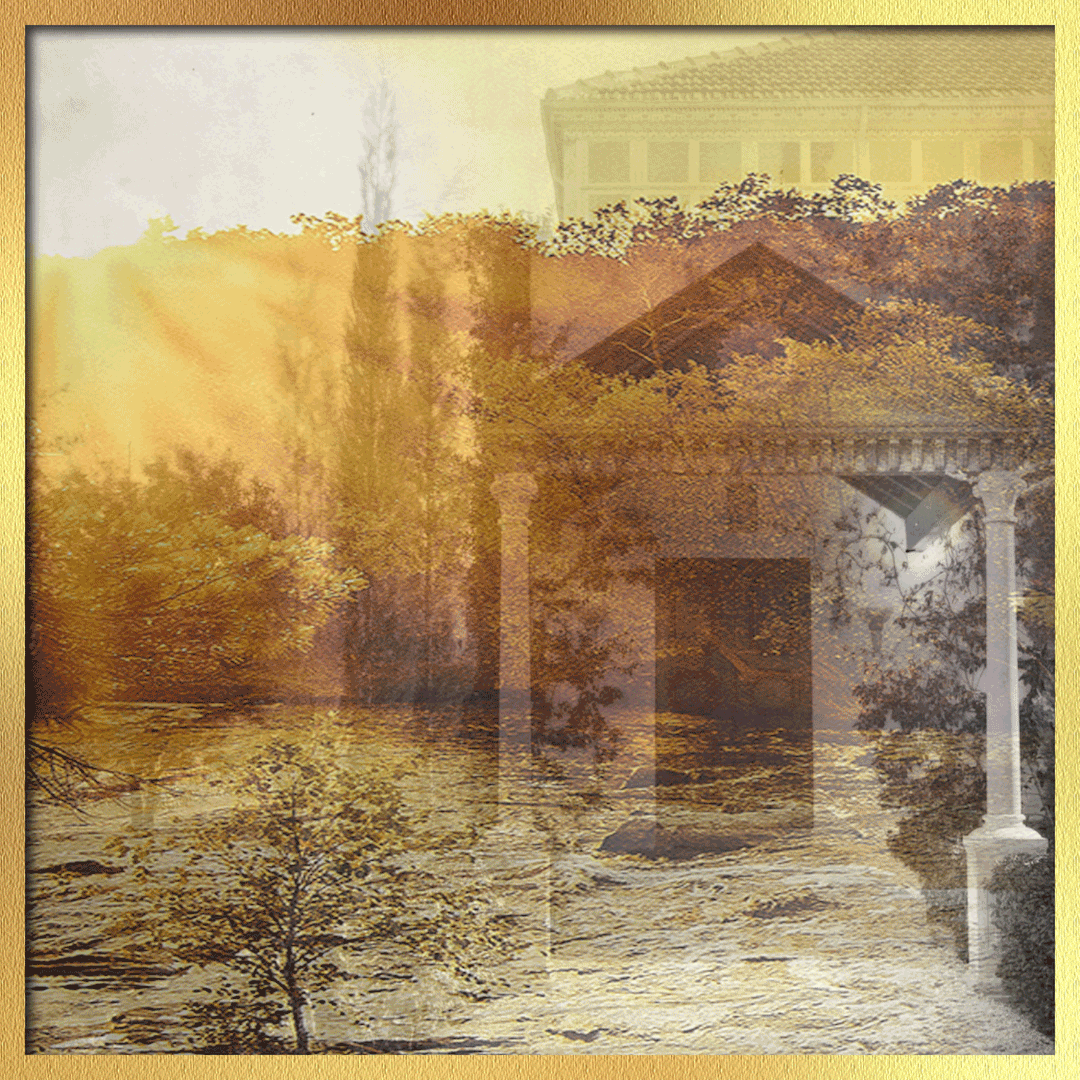
A double exposure to illustrate 'Abdu'l-Bahá’s eloquent telegram to the Sulṭán: “The Sun of Bahá has set.” Photograph of Shrine: Source: Bahá'í Media Bank © Bahá'í International Community. Photograph of Sunset: Photo by Todd Trapani on Pexels.
'Abdu'l-Bahá immediately sent a telegram to Sulṭán ‘Abdu’l-Ḥamíd which began with the words “the Sun of Bahá has set,” in which He informed the Sulṭán of His intention to inter the sacred remains of Bahá'u'lláh within the precincts of the Mansion of Bahjí, an arrangement to which the Sulṭán readily assented.
Shoghi Effendi, God Passes By.
The Sun of Bahá Has Set: Taherzadeh, Adib. The Revelation of Bahá’u’lláh, Volume 4 (Mazra‘ih & Bahjí, 1877–1892) pages 413-421.
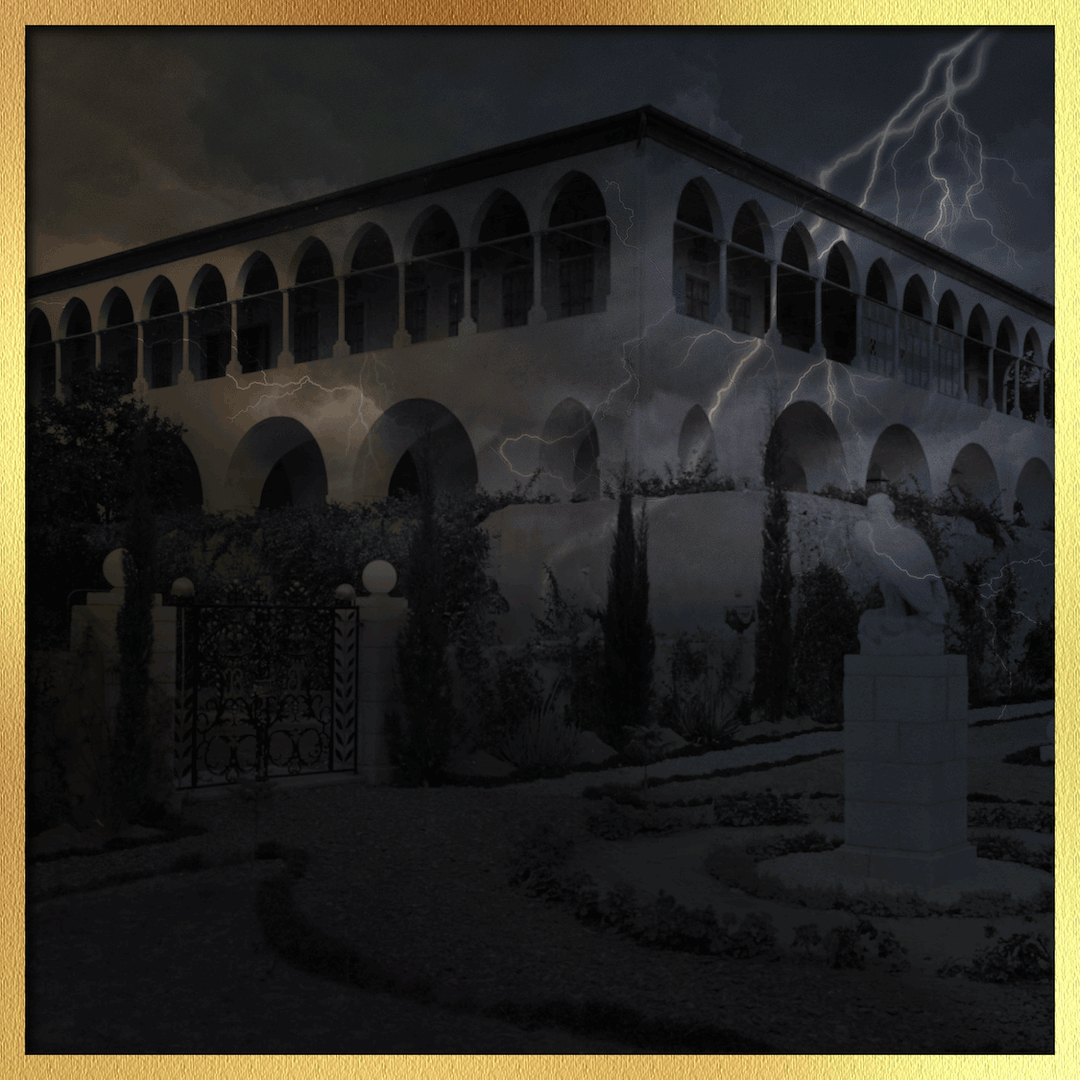
A double exposure to illustrate the betrayal of Muḥammad ‘Alí in this difficult time for 'Abdu'l-Bahá and the Holy Family. Photograph of the Mansion of Bahjí: Bahá'í Media Bank © Bahá'í International Community. Photograph of storm clouds: Photo by Johannes Plenio on Pexels and Antonio Treccarichi on Pexels.
Despite some deeply unfaithful acts starting in Adrianople and continuing in 'Akká, he had mostly played the part of being a loyal son to Bahá'u'lláh and brother to 'Abdu'l-Bahá, but he showed his true self and his despicable plans to overthrow 'Abdu'l-Bahá as the Center of the Covenant before the blessed remains of Bahá'u'lláh were laid to rest.
Bahá'u'lláh had a long-standing practice of placing all His papers and seals in two large cases which He had, a few days prior, entrusted to 'Abdu'l-Bahá, who had asked for Mírzá Majdi’d-Dín’s help.
The morning of 29 May 1892, as 'Abdu'l-Bahá was getting ready to wash Bahá'u'lláh’s holy body and prepare it for burial, Muḥammad ‘Alí suggested removing Bahá'u'lláh’s cases from the room, lest they get wet. 'Abdu'l-Bahá was in such a state of grief and shock that He was barely conscious of His surroundings and could never have imagined that His treacherous half-brother was plotting to steal them, in the same room as Bahá'u'lláh’s sacred remains. 'Abdu'l-Bahá agreed to Muḥammad ‘Alí’s suggestion, who took Bahá'u'lláh’s two precious cases out of the room. It was the last 'Abdu'l-Bahá ever saw of them
Among important papers and Tablets, and several of Bahá'u'lláh’s carved seals, the two cases also contained the text containing Bahá'u'lláh’s corrections to Nabíl’s Narrative. Nothing was ever recovered.
In a heartbreaking Tablet to a Bahá'í of Shíráz, 'Abdu'l-Bahá spoke of this first great betrayal by the Covenant Breakers: “The centre of violation [Muḥammad ‘Alí]purloined, in its entirety, the Divine trust which specifically appertained to this servant. He took everything and returned nothing. To this day the usurper unjustly remains in possession. Although each single item is more precious for 'Abdu'l-Bahá than the dominion of earth and heaven, till now I have kept silent and have not breathed a word, lest it bring us into disrepute amongst strangers. This was a severe blow to me. I suffered, I sorrowed, I wept, but I spoke not.”
A few days later, a believer asked 'Abdu'l-Bahá if he could have one of Bahá'u'lláh’s seals affixed to a Tablet He had revealed for him. When 'Abdu'l-Bahá asked Mírzá Muḥammad-‘Alí to bring the seals, he claimed he didn’t know where they were, and that he had never received them.
‘Alí Nakhjávání: Shoghi Effendi: The Range and Power of His Pen, Acuto, Italy 2006, pages 93-94.
H.M. Balyuzi, ‘Abdu’l-Bahá: The Centre of the Covenant of Bahá’u’lláh, page 54.
Adib Taherzadeh, The Covenant of Bahá'u'lláh, Chapter 10: The Appointment of 'Abdu'l-Bahá.
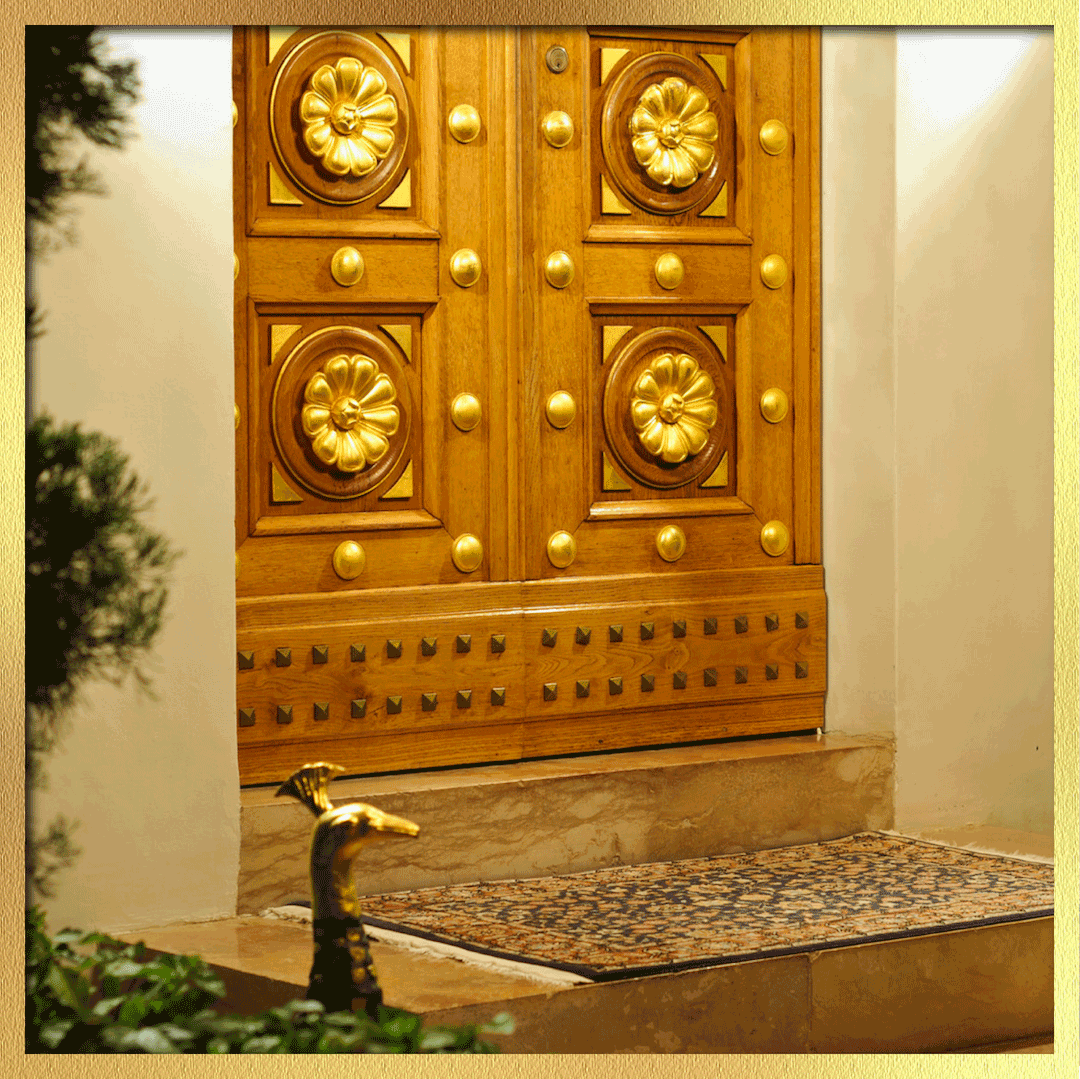
A splendid photograph showing the exquisite detail of the door to the inner Shrine of Bahá'u'lláh, where He was laid to rest on the day of His Ascension. © Chad Mauger, all rights reserved, used with permission. Source: Flickr.
Bahá’u’lláh was accordingly laid to rest in the northernmost room of the house which served as a dwelling-place for His son-in-law, the most northerly of the three houses lying to the west of, and adjacent to, the Mansion. Bahá'u'lláh’s interment took place shortly after sunset on the very day of His Ascension.
Adib Taherzadeh, The Revelation of Bahá'u'lláh Volume 4: Mazra’ih and Bahjí 1877-1892, pages 413-421.
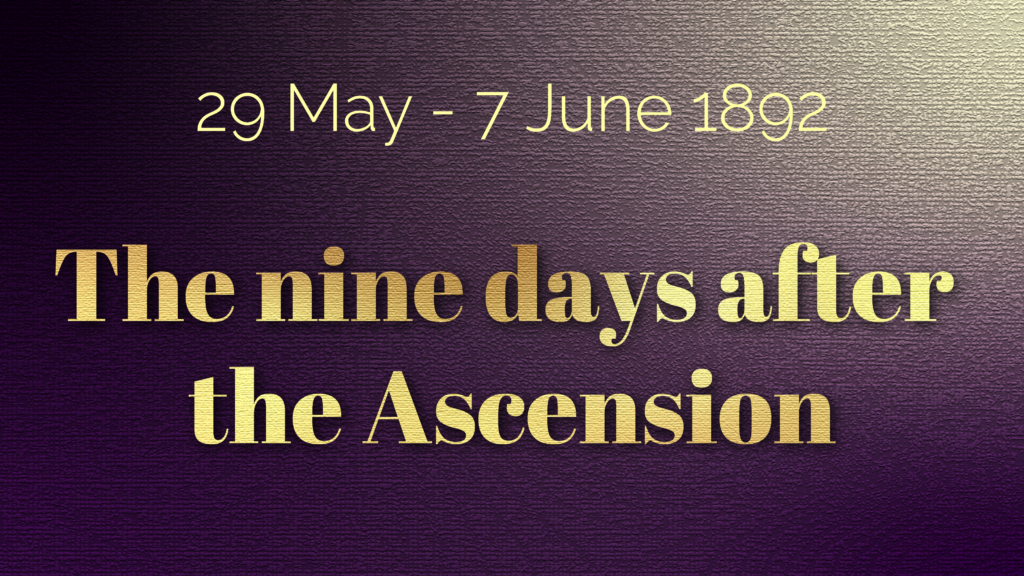
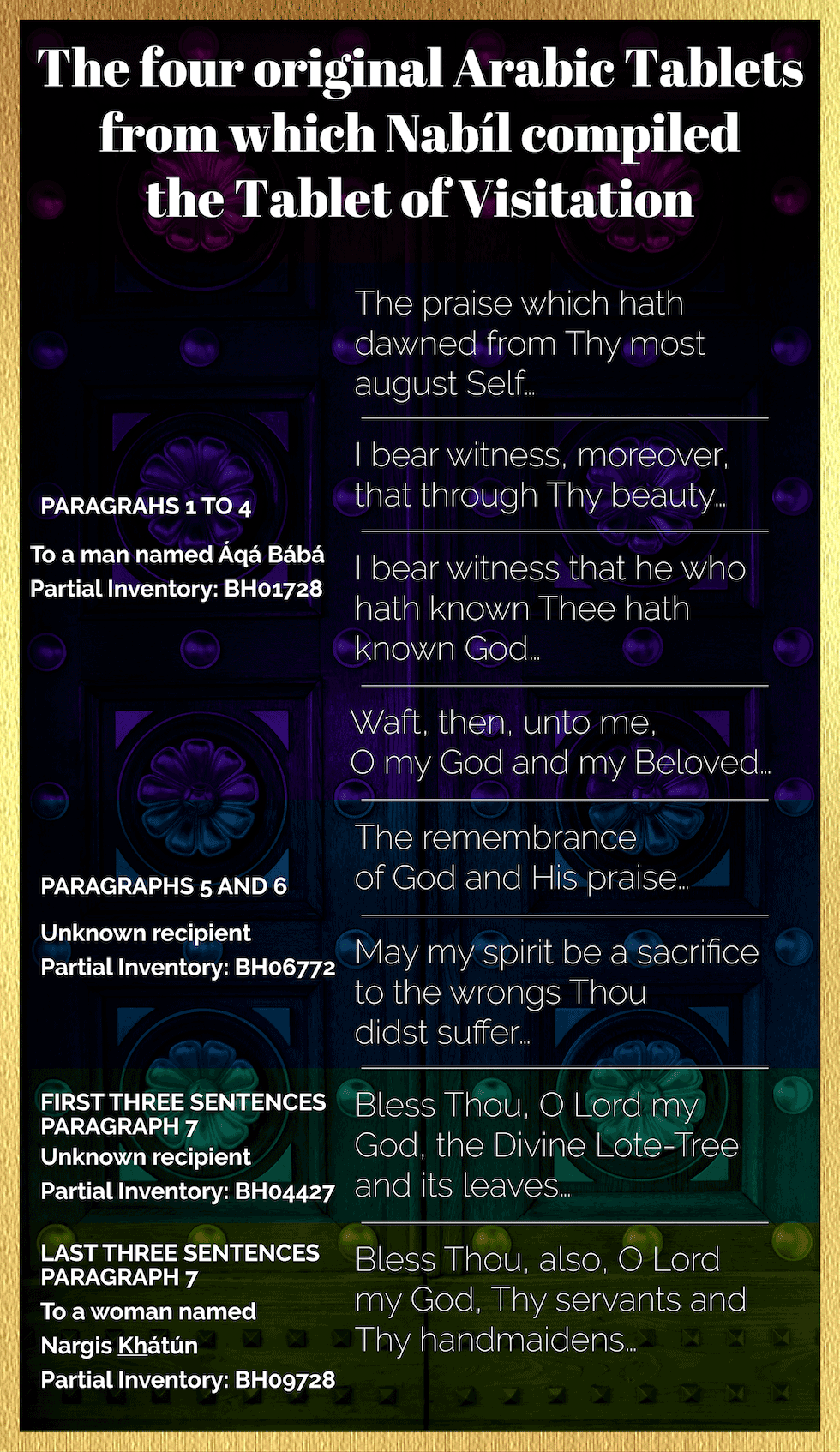
In homage to Nabíl’s last tribute of love to Bahá'u'lláh, and in gratitude for the magnificent prayer He compiled for all future generations of Bahá'ís, a breakdown of his masterful work, with source Tablets corresponding to paragraphs of the Tablet of Visitation for Bahá'u'lláh and the Báb. Full list of sources below the story. Background: five-color processed image of the door to the Shrine of Bahá'u'lláh, which pilgrims enter in order to recite the Tablet of Visitation at the Holy Threshold. Source: Bahá'í Media Bank © Bahá'í International Community. Note: Partial Inventory numbers refer to the Partial Inventory of the Works of the Central Figures of the Bahá'í Faith, an indispensable tool to navigate the Ocean of Bahá'u'lláh’s Revelation, available in PDF format for download at Loom of Reality.
Nabíl was inconsolable after Bahá'u'lláh’s Ascension. Consumed by grief and heartbreak, He paid a last tribute to Bahá'í in the form of a supplication which includes this stirring passage: “From the moment Thou didst mount Thy throne at the hour of dawn on the 2nd on Muharram 1233 (12 November 1817) until Thy ascension to the Realms of Eternity, eight hours after sunset on the 2nd of Dhi'l-Qa'dih 1309 (29 May 1892)…Thou wert at all times, at day and at night, each month and each year, the cause of the exaltation of mankind.”
'Abdu'l-Bahá asked Nabíl, in the midst of his unbearable sorry, to compile the Tablet of Visitation for Bahá'u'lláh, using Tablets He had revealed during His lifetime. Nabíl excerpted four paragraphs from four individual Tablets in Arabic, which compose the Tablet of Visitation for Bahá'u'lláh and the Báb which we recite on Holy Days and on pilgrimage to their Shrines.
To listen to the entire Tablet of Visitation for Bahá'u'lláh recited in Arabic with English subtitles and transliteration, please click here or on the image below:
Adib Taherzadeh, The Revelation of Bahá'u'lláh Volume 4: Mazra’ih and Bahjí 1877-1892, pages 418-419.
ORIGINAL SOURCES FOR THE TABLET OF VISITATION FOR BAHÁ'U'LLÁH AND THE BÁB
Paragraphs 1-4:
Recipient: Áqá Bábá
Partial Inventory ID: BH01728
Arabic original available at Iranian National Bahá'í Archives.
Paragraphs 5 & 6:
Recipient: as yet unknown
Partial Inventory ID: BH06772
Arabic original available at Bahá'í Reference Library.
First part of paragraph 7:
Recipient: as yet unknown
Partial Inventory ID: BH04427
Arabic original available at Bahá'í Reference Library.
Second part of paragraph 7:
Recipient: Nargis Khátún
Partial Inventory ID: BH09728
Arabic original available at Bahá'í Reference Library.
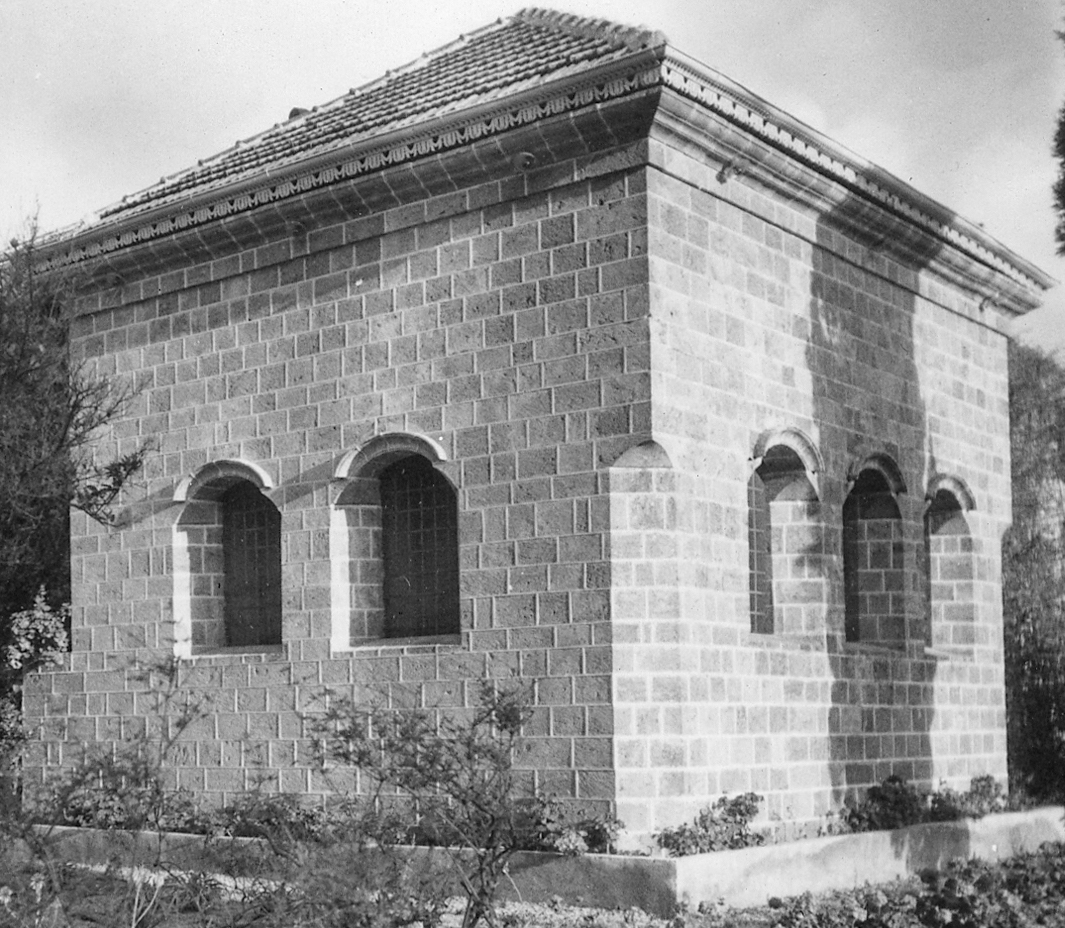
To honor Shaykh Maḥmúd’s lifelong loyalty to Bahá'u'lláh, exemplified by him keeping watch for seven days while the wall of the inner Shrine was being constructed, a close up photograph of the wall of the Shrine of Bahá'u'lláh. Disclaimer: We have no information which wall the story below refers to. Source: Bahá'í Media Bank © Bahá'í International Community.
Shaykh Maḥmúd, originally Bahá'u'lláh’s bitter foe who had tried three times to find a way into His presence and kill Him while Bahá'u'lláh was in the Most Great Prison, had become one of Bahá'u'lláh’s earliest followers from the population of 'Akká, and one of His most devoted. After the Ascension, Shaykh Maḥmúd set up a tent just outside His resting-place and kept watch for an entire week while construction work to strengthen the outer wall of Bahá'u'lláh’s Shrine was completed.
H.M. Balyuzi, Bahá'u'lláh: The King of Glory, page 338.
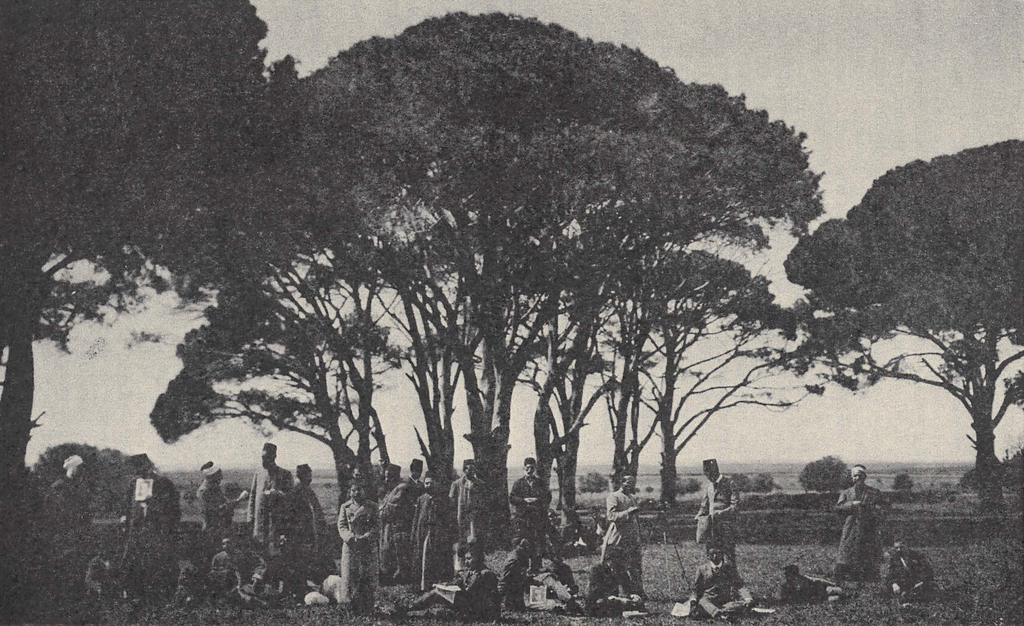
Pilgrims at Bahji in 1914, under the pines where the hundreds of mourners congregated for a week of mourning from 29 May to early June 1892, honoring and praising Bahá'u'lláh and lamenting His loss.
Bahá'u'lláh’s Ascension had a devastating effect on the Bahá'í community and on the community at large. For a full week after His passing, five hundred mourners poured trough the gates of the Mansion of Bahjí. Sunní and Shí’ah Muslims, Christians, Jews, and Druze, Ottoman officials and merchants, leading figures and priests, learned men and poets, rich and poor, the orphans and the oppressed partook with heavy hearts of the food the bereaved and heartbroken Holy Family prepared for them without cease. They came in great numbers to pay their final respects to Bahá'u'lláh and mourned Him like a king, yet at the time of His death, He was still a prisoner of the Ottoman Empire.
The plain stretching from 'Akká to the Mansion of Bahjí teemed with crowds who came to grieve with others, lament their immense loss of the man who by the Power vested in Him by God had made their lives better, given them clean water and better air for the first time in three decades. Their farewell to Bahá'u'lláh was not even on the same plane of comparison as their hateful, jeering welcome, twenty-four years ago, when they had come to insult the “God of the Persians.” A quarter of a century later, they were mourning one of the very best of their own.
The news of Bahá'u'lláh's passing had been announced with all the pomp and circumstance reserved for very great men, and proclaimed from the minarets of every mosque throughout the region. People responded to the call, and converged from the surrounding villages to Bahjí to pay their respects. According to Arab custom, many Shaykhs brought lambs, rice, sugar and salt for the poor in return for their prayers for the soul of the departed.
The majority of the 500 mourners camped beneath the pines at Bahjí, where 'Abdu'l-Bahá had held his “test banquet” 15 years, to see if Bahá'u'lláh would be let out of the Land Gate of 'Akká to Mazra’ih. While they remained in mourning for seven days, the call to prayer rose them at dawn, and Bahá'u'lláh’s beautiful prayers were chanted from the Mansion’s upper-floor balcony. Poets sang marthíyih, songs in praise of the departed, Shaykhs chanted prayers and lamentations, and gave funeral orations praising Bahá'u'lláh’s long life of personal sacrifice for the good of others.
'Abdu'l-Bahá and the Holy Family were constantly in attendance, making sure their guests had enough food, day or night, and 'Abdu'l-Bahá oversaw the details of the week-long hospitality Himself, and donated money to the poor on each of the nine official days of mourning.
H.M. Balyuzi, Bahá'u'lláh: The King of Glory, page 425.
Taherzadeh, Adib. The Revelation of Bahá’u’lláh, Volume 4 (Mazra‘ih & Bahjí, 1877–1892), page 417.
Lady Blomfield, The Chosen Highway.
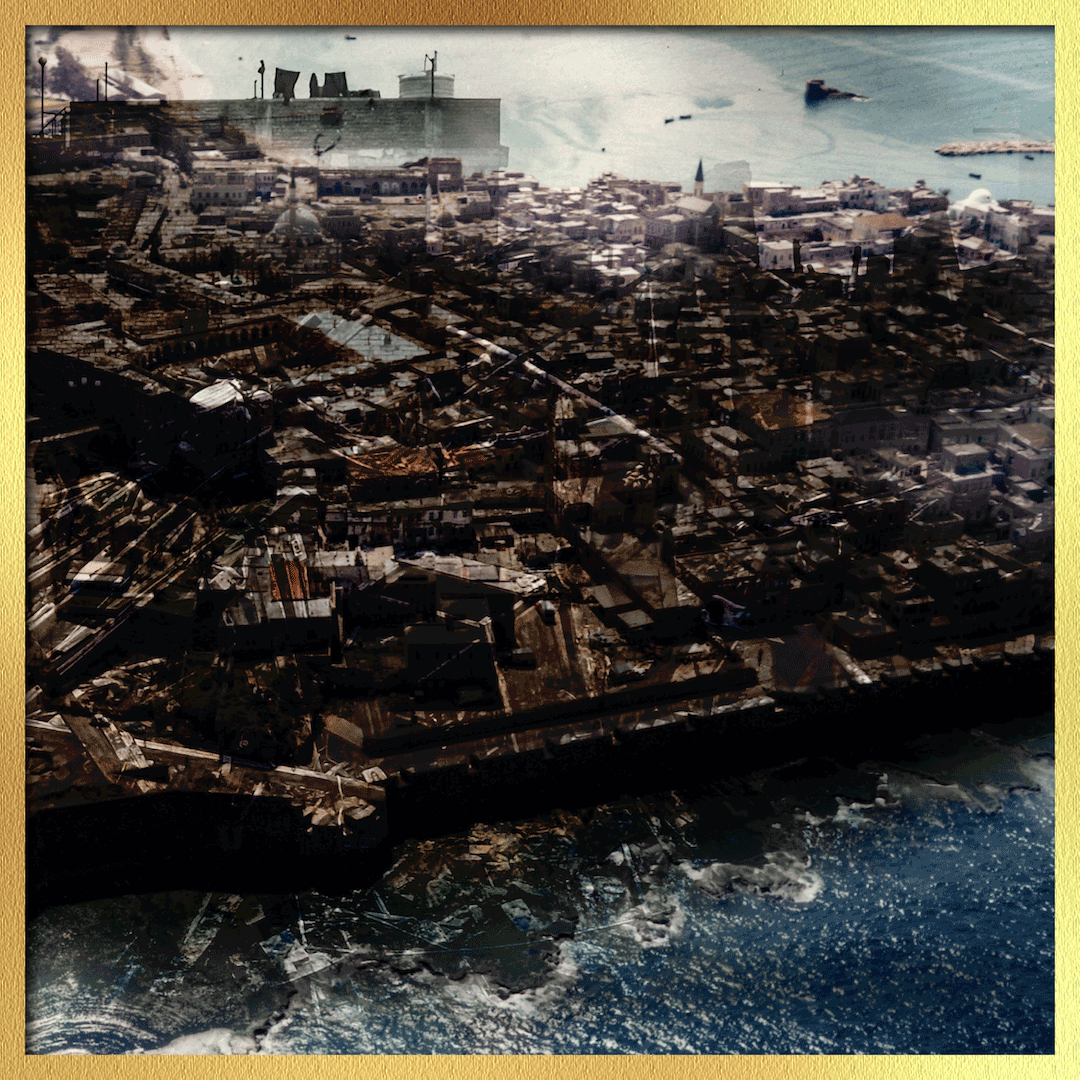
To illustrate the spiritual commotion that overtook 'Akká and its environs, Bahá'ís and their friends, a double-exposure image of 'Akká overlaid with the aftermath of a spiritual quake. Photograph of 'Akká: Bahá'í Media Bank © Bahá'í International Community. Photograph of the aftermath of a (physical) earthquake: Photo by Sanej Prasad Suwal at Pexels.
A devastated Nabíl, steadfast to his calling as a historian, left us with a vivid description of the agony of the days following the Ascension of Bahá'u'lláh: “Methinks, the spiritual commotion set up in the world of dust had caused all the worlds of God to tremble.… My inner and outer tongue are powerless to portray the condition we were in.… In the midst of the prevailing confusion a multitude of the inhabitants of ‘Akká and of the neighboring villages, that had thronged the fields surrounding the Mansion, could be seen weeping, beating upon their heads, and crying aloud their grief.”
Shoghi Effendi, God Passes By.
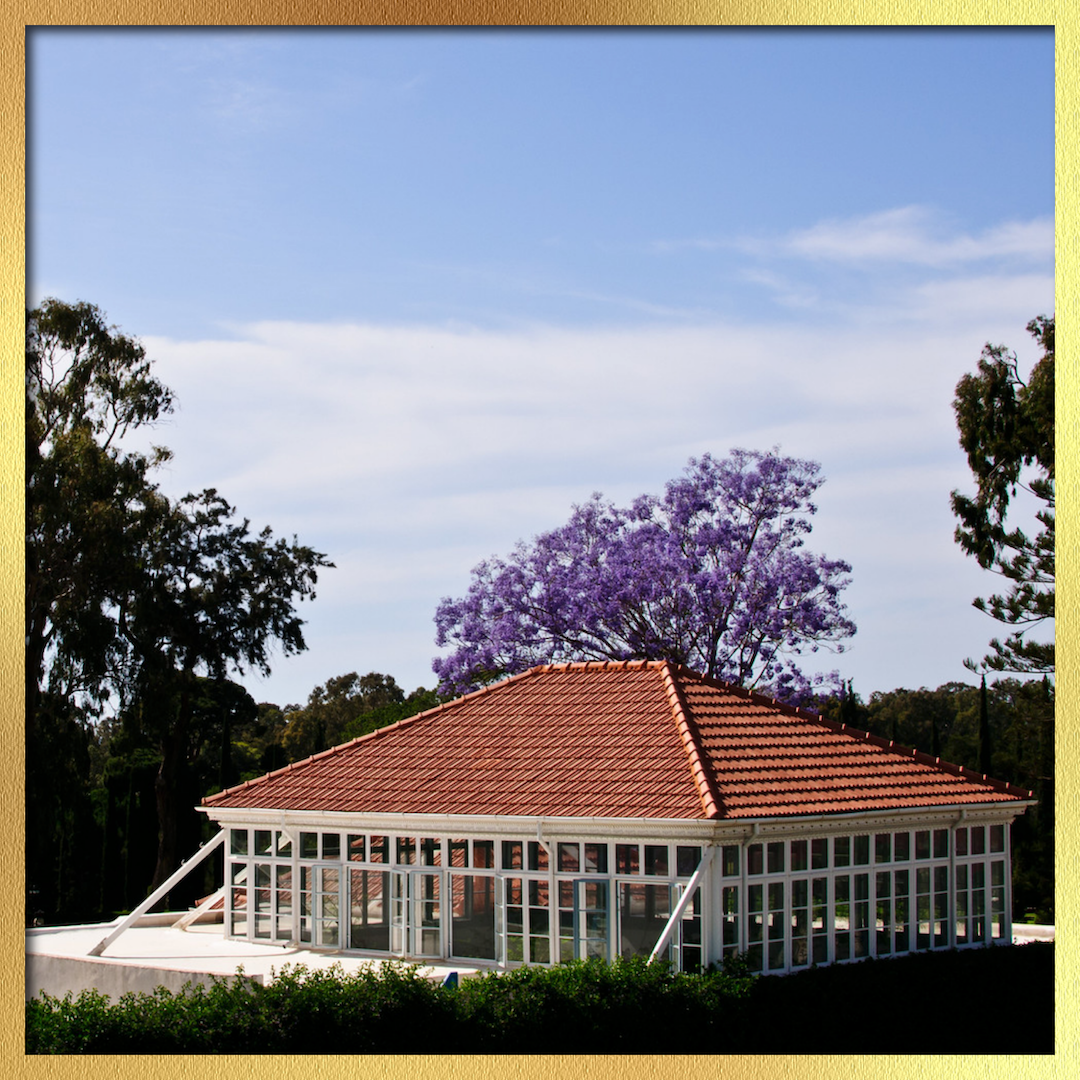
As an illustration of the heavenly praises and tributes, eulogies and cablegrams, letters and poems received by 'Abdu'l-Bahá in the days following the Ascension of Bahá'u'lláh, a celestial view of the Shrine of Bahá'u'lláh by © Chad Mauger, all rights reserved, used with permission. Source: Flickr.
Tributes to Bahá'u'lláh’s greatness and majesty poured in from cities as far away as Damascus, Aleppo, Beirut and Cairo in Arabic and Turkish. The Ascension of Bahá'u'lláh had evoked effusive manifestations of sorrow and touching expressions of praise and admiration in the heart of friends of the Faith, yet they paled in comparison to the ocean of grief, the unbounded devotion that poured out from the hearts of the countless thousands of Bahá'ís in Persia, India, Russia, ‘Iráq, Turkey, Palestine, Egypt, and Syria.
All the glowing tributes to Bahá'u'lláh were given to 'Abdu'l-Bahá, now the heart and soul of the Center of the Cause, and Whose praises were intermingled in these messages with praises for Bahá'u'lláh. From the second day after Bahá'u'lláh’s passing, men of learning and poets, Muslims and Christians had started sending 'Abdu'l-Bahá telegrams and expressions of sincere condolences, poems extolling Bahá'u'lláh’s virtues and lamenting His Ascension.
Shoghi Effendi, God Passes By excerpt 1, and God Passes By excerpt 2.
Adib Taherzadeh, The Revelation of Bahá'u'lláh Volume 3: ‘Akká, the Early Years 1868-1877, pages 21-22.
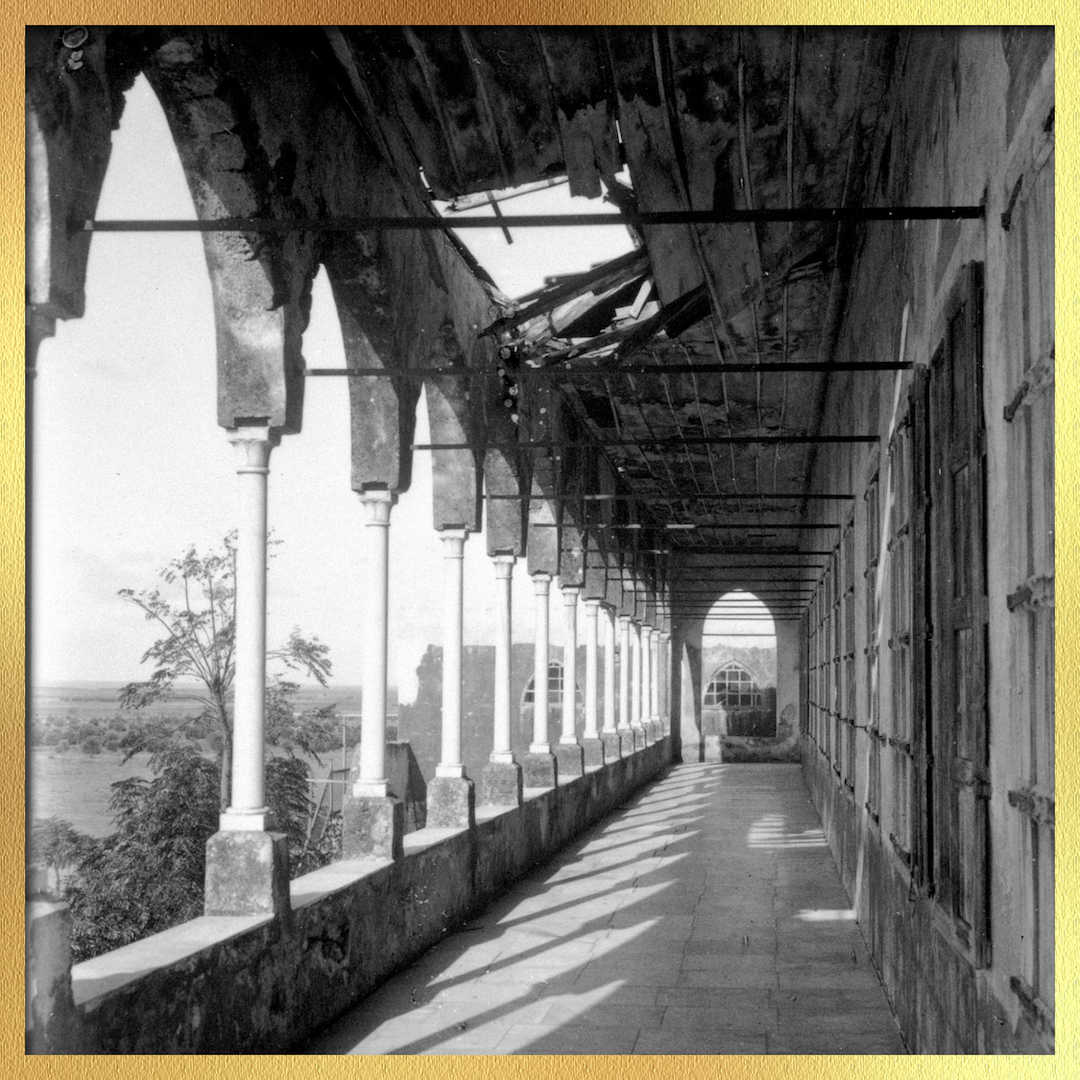
To illustrate a story that broke 'Abdu'l-Bahá’s heart, we purposefully chose an older black and white photograph of the western gallery of the Mansion of Bahjí, where part of the story below takes place, in a state of disrepair, an expression of the sadness that encompassed 'Abdu'l-Bahá as He witnessed the violation of Bahá'u'lláh’s precious cases. This photograph was taken just before Shoghi Effendi began its restoration in 1929. Source: Bahá'í Media Bank © Bahá'í International Community.
For the three days and nights since Bahá'u'lláh’s interment, 'Abdu'l-Bahá had been heartbroken and disconsolate. He wept for hours, in a state of unbearable grief and neither slept nor rested for a single moment. The light of His world had gone out, and He was finding His way in darkness. The fourth night after the Ascension around midnight, 'Abdu'l-Bahá rose from His bed and walked a few steps to the window, seeking a measure of peace and tranquility, but what He witnessed was a desecration shocking beyond belief.
In his “epistle of repentance” Muḥammad ‘Alí’s brother Mírzá Badí'u'lláh revealed the extent of Muḥammad ‘Alí’s treachery which led to the scene 'Abdu'l-Bahá had just witnessed. Three days after the Ascension, his brother asked him for the keys so he could open the cases, saying “Bahá'u'lláh has placed a certain document in these cases which needs to be studied.” Muḥammad ‘Alí was no doubt searching for Bahá'u'lláh’s Last Will and Testament.
Muḥammad ‘Alí, with help from his wife, Mírzá Majdi’d-Dín, ‘Alí Riḍá. and his sister, hoisted the cases out of the window onto the balcony of the Mansion and into Mírzá Muḥammad ‘Alí’s room. Claiming that Bahá'u'lláh had invested him in a Tablet with the responsibility to protect His Holy Writings, Muḥammad ‘Alí removed all the Tablets revealed in honor of individual Bahá'ís. In his mad ravings that early morning, Muḥammad ‘Alí suggested 'Abdu'l-Bahá was against the Cause of Bahá'u'lláh and that He would use these very Tablets to obliterate every trace of Bahá'u'lláh from this world.
'Abdu'l-Bahá was deeply disturbed by the scene of His half-brothers violating Bahá'u'lláh’s cases and searching through the papers the Blessed Beauty had so clearly entrusted to Him. The cruel treachery, on the very day of Bahá'u'lláh's Ascension, inflicted further pain and suffering on His sorrow-laden heart. 'Abdu'l-Bahá returned to His bed immediately after this incident. He did not want Muḥammad ‘Alí and Mírzá Badí'u'lláh to know He had seen them, and surmised that since they had not found Bahá'u'lláh’s Will and Testament, they were looking for another document that would help them in their designs to hurt the Cause and creating dissension and division within the ranks of the believers. It was 'Abdu'l-Bahá’s sincere hope that they would return these cases, His sacred trust, to Him, after seeing the Kitáb-i-‘Ahd, in which Bahá'u'lláh specifically denies His sons “any right to the property of others."
Adib Taherzadeh, The Covenant of Bahá'u'lláh, Chapter 11: The Breaking of Bahá'u'lláh's Covenant.
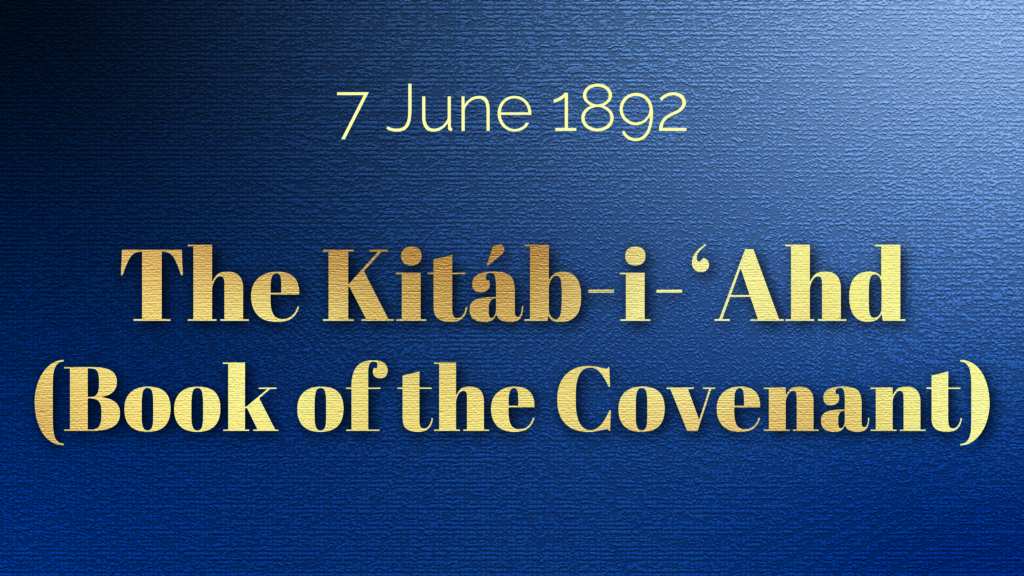
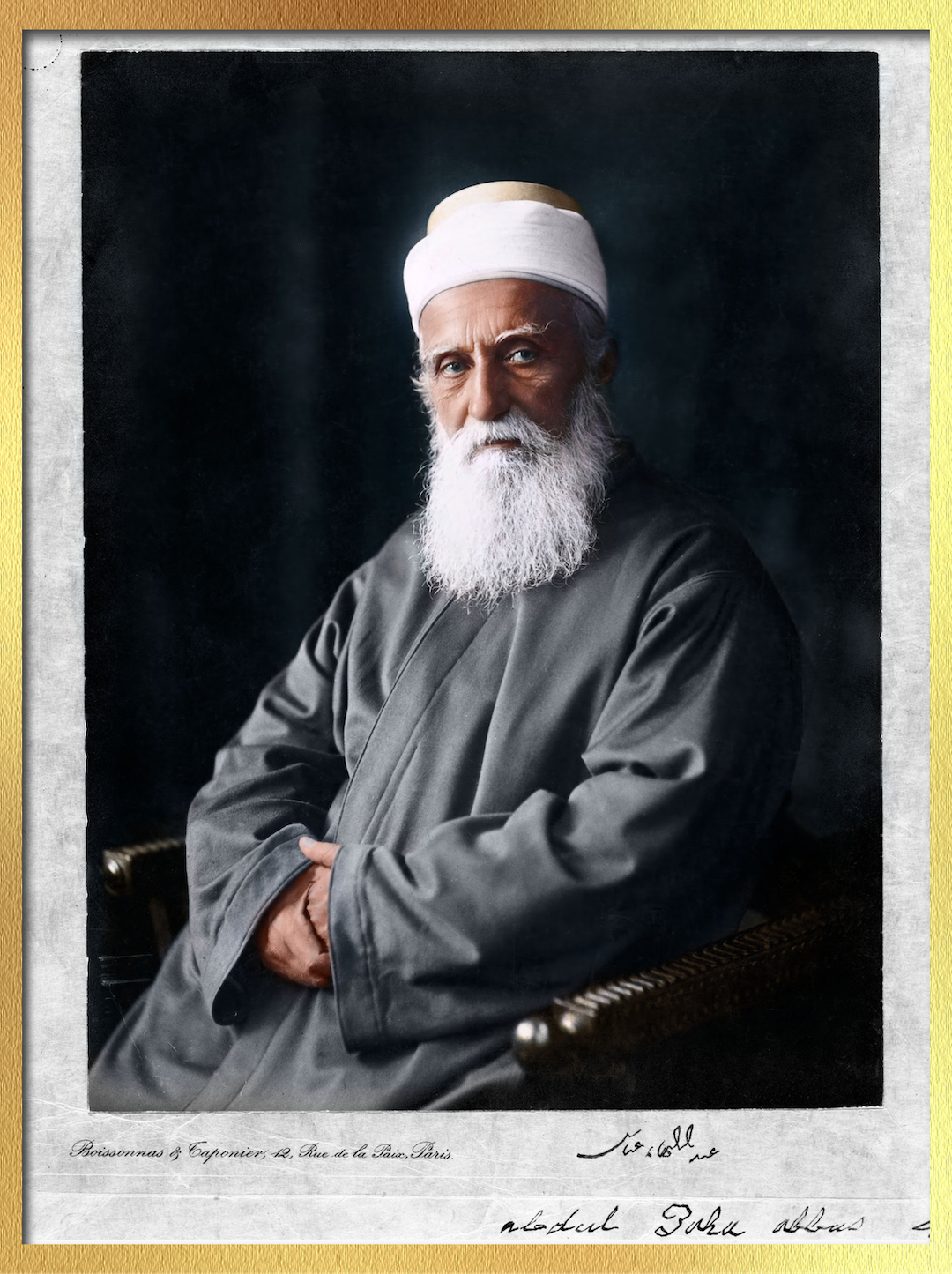
'Abdu'l-Bahá, Center of the Covenant of Bahá'u'lláh. This colorized portrait of Him in Paris in October 1911, was the first He allowed since 1868 in Adrianople, and was taken exactly 19 years after the Ascension of Bahá'u'lláh. 'Abdu'l-Bahá’s signature in Persian and in English can be seen in the bottom right. Source: Bahá'í Media Bank © Bahá'í International Community.
Sometime after the Ascension of Bahá'u'lláh, 'Abdu'l-Bahá had sent to 'Akká for the box containing Bahá'u'lláh’s Will and Testament, the Kitáb-i-‘Ahd, and on the ninth day following the Ascension, marking the end of the mourning period, Áqá Riḍá-i-Qannád read the Kitáb-i-‘Ahd for the first time to nine witnesses chosen from among Bahá'u'lláh’s family and followers, including Mírzá Muḥammad ‘Alí.
On the afternoon of the same day, Mírzá Majdi’d-Dín read the Kitáb-i-‘Ahd a second time inside the Shrine of Bahá'u'lláh before a large assembly of pilgrim and resident Bahá'ís, male descendants of the Báb, Afnáns, and male descendants of Bahá'u'lláh, Aghṣán.
On 7 June 1892, the deeply ambitious Mírzá Muḥammad ‘Alí, his scheming brother Mírzá Badí'u'lláh, and His envious nephew Mírzá Majdi’d-Dín, one of the readers of the Kitáb-i-‘Ahd, had twice listened to Bahá'u'lláh’s Last Will and Testament, beginning with the momentous words “The Will of the divine Testator is this…” in which He named 'Abdu'l-Bahá Center of the Covenant and placed their stations irrevocably below His: “The Will of the divine Testator is this: It is incumbent upon the Aghsán, the Afnán and My Kindred to turn, one and all, their faces towards the Most Mighty Branch ['Abdu'l-Bahá]. Consider that which We have revealed in Our Most Holy Book: ‘When the ocean of My presence hath ebbed and the Book of My Revelation is ended, turn your faces towards Him Whom God hath purposed, Who hath branched from this Ancient Root.’” All three would later break the Covenant, while Mírzá Muḥammad ‘Alí would become the Arch-breaker of the Covenant of Bahá'u'lláh.
H.M. Balyuzi, Bahá'u'lláh: The King of Glory, page 338.
Adib Taherzadeh, The Revelation of Bahá'u'lláh Volume 4: Mazra’ih and Bahjí 1877-1892, pages 419-420.
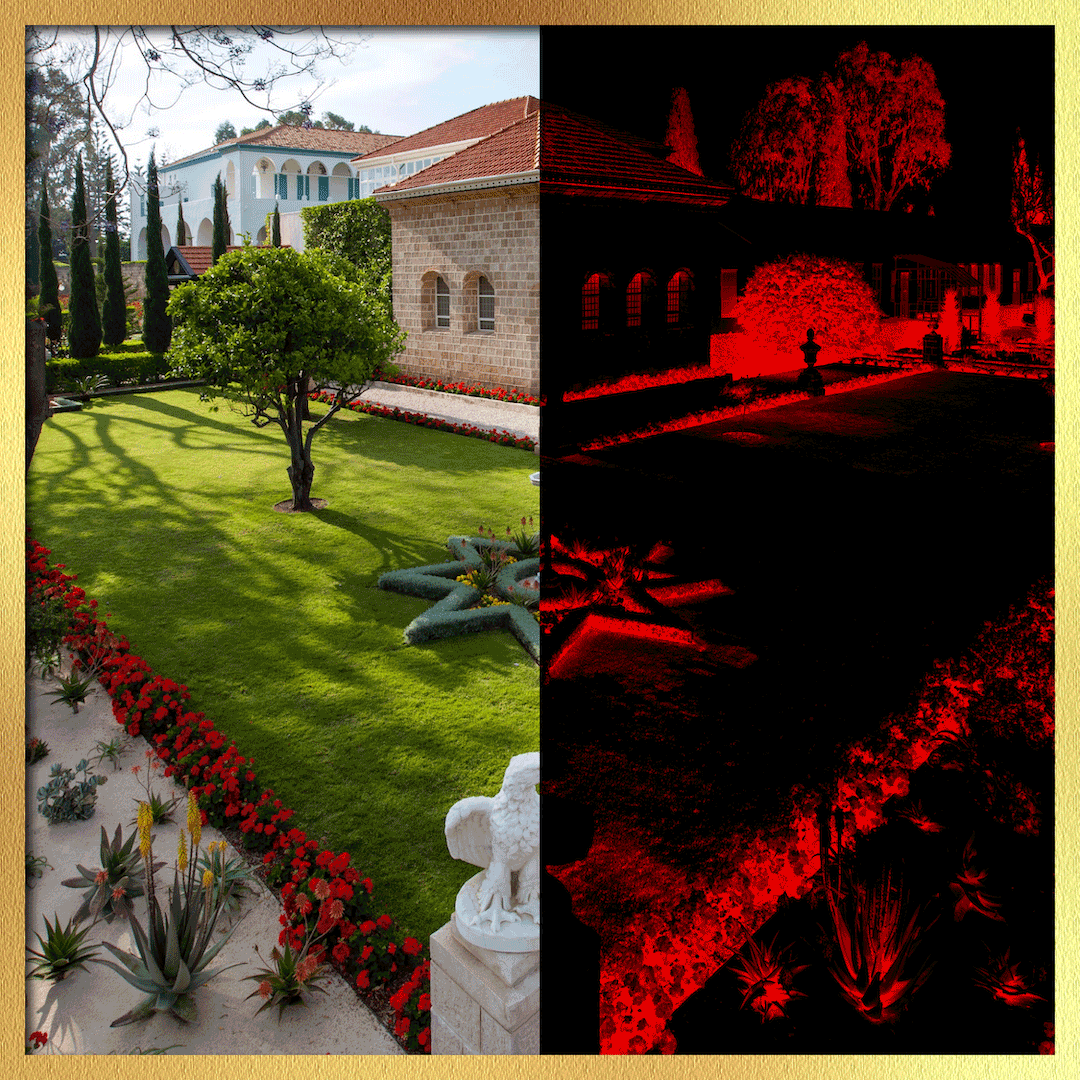
An illustration of those who turned towards and against the Covenant after the Kitáb-i-‘Ahd was made public, afforded by the perfect symmetry of the gardens around the Shrine of Bahá'u'lláh, the Ḥaram-i-Aqdas (Most Holy Precincts) designed by Shoghi Effendi. Source: Bahá'í Media Bank © Bahá'í International Community.
'Abdu'l-Bahá stated that the foundations of Covenant-breaking were laid on this day. After the reading of Bahá'u'lláh’s Last Will and Testament, the faithful believers rejoiced with great happiness, while the unfaithful wallowed in deep sorrow. The faces of the steadfast Bahá'ís were wreathed in light of joy, and those of the Covenant-breakers were darkened by the dust of gloom.
Covenant-breaking, born of jealousy of the Center of Covenant started to grow, though not immediately after the Ascension. As soon as the Kitáb-i-‘Ahd was made public to all Bahá'ís, it had the effect of an exam on students, dividing them between those who passed the test of faithfulness to the Covenant, and those who failed, those who remained faithful to its provisions and entered the ark of salvation, and those who violated them were cast out of the community as Covenant-breakers.
H.M. Balyuzi, Bahá'u'lláh: The King of Glory, page 338.
Adib Taherzadeh, The Revelation of Bahá'u'lláh Volume 4: Mazra’ih and Bahjí 1877-1892, pages 419-420.
Adib Taherzadeh, The Covenant of Bahá'u'lláh, Chapter 11: The Breaking of Bahá'u'lláh's Covenant.
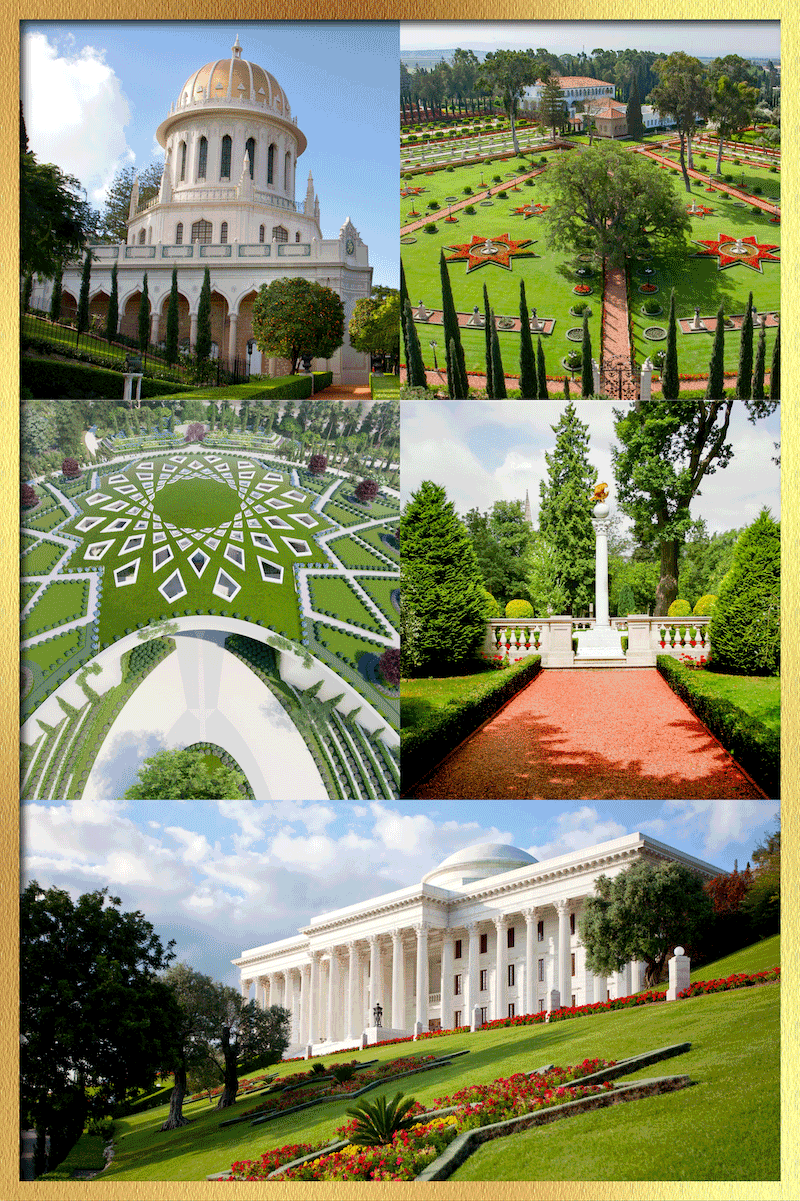
A visual history of the Covenant in the Bahá'í Revelation, from the Báb to Bahá'u'lláh, to 'Abdu'l-Bahá, to Shoghi Effendi, to the Universal House of Justice. Source: All photos from Bahá'í Media Bank: Shrine of the Báb, Shrine of Bahá'u'lláh, Graphic Rendering of the Shrine of 'Abdu'l-Bahá, Resting place of Shoghi Effendi in London, Seat of the Universal House of Justice © Bahá'í International Community.
The Kitáb-i-‘Ahd embodies the Covenant, as it passes down authority from the Manifestation of God to the Center of the Covenant, Covenant which 'Abdu'l-Bahá has described as “So firm and mighty” “that from the beginning of time until the present day no religious Dispensation hath produced its like.”
'Abdu'l-Bahá explained that the pivot, or the central point or pin, of the oneness of mankind is the Center of the Covenant, that the “Sure Handle,” mentioned in ancient religious scripture is the Covenant and Testament, that the Covenant is the light of the world, and that the Bahá'í Dispensation was blessed with a new Covenant and a new Testament, set down to the Pen of the Most High and without a parallel in religious history.
The power of the Covenant, says 'Abdu'l-Bahá “is as the heat of the sun which quickeneth and promoteth the development of all created things on earth. The light of the Covenant, in like manner, is the educator of the minds, the spirits, the hearts and souls of men.”
'Abdu'l-Bahá used so many eloquent terms to refer to the Covenant, calling it the “Conclusive Testimony,” the “Universal Balance,” the “Magnet of God’s grace,” the “Upraised Standard,” the “Irrefutable Testament,” “the all-mighty Covenant, the like of which the sacred Dispensations of the past have never witnessed” and “one of the distinctive features of this most mighty cycle.”
Shoghi Effendi, God Passes By.
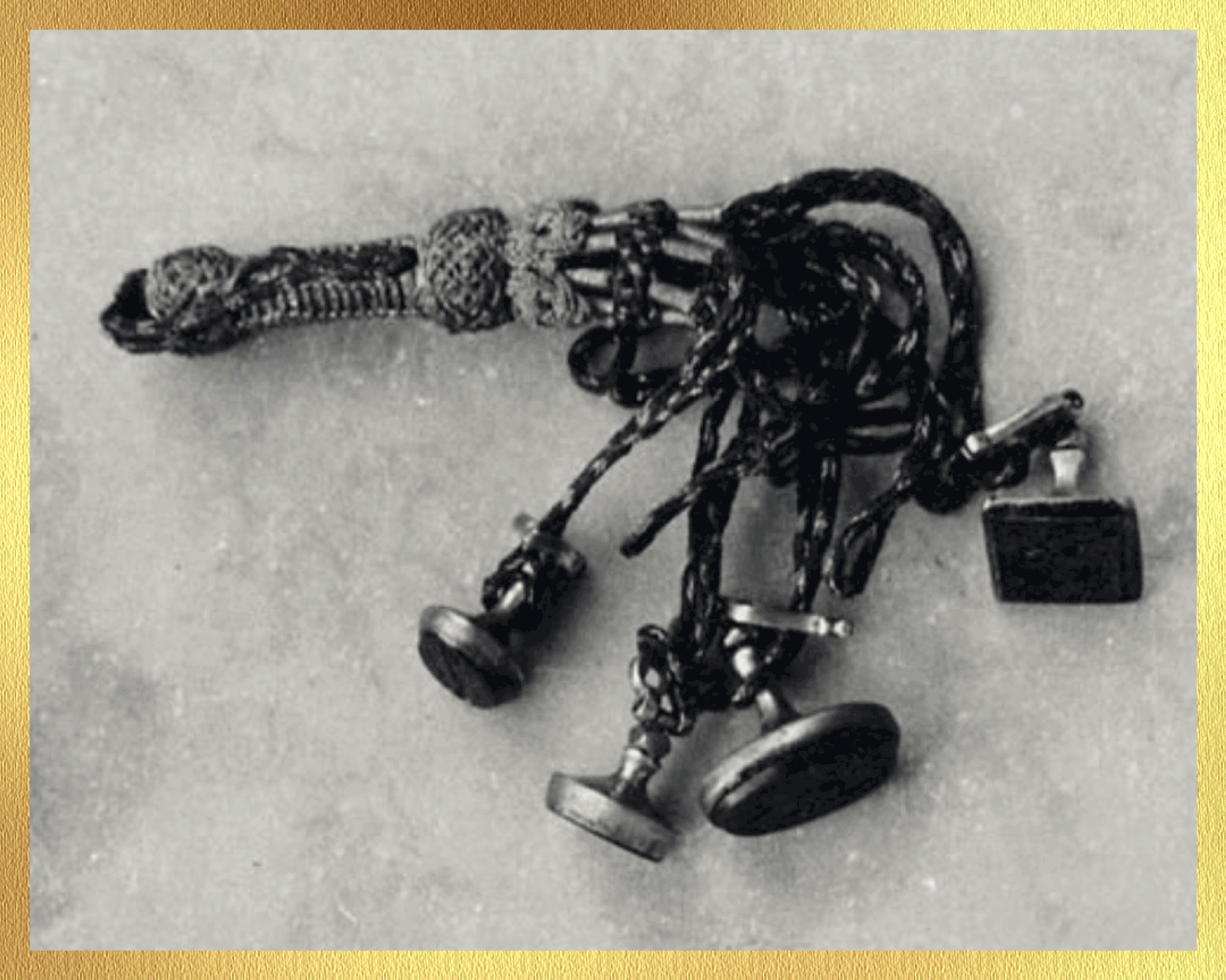
Bahá'u'lláh’s seals are the subject of the story below. Here are several of the carved seals of Bahá’u’lláh which were thankfully not stolen by Mírzá Muḥammad-‘Alí, and which Bahá'u'lláh used to guarantee authorship on Tablets, which is what one of the Afnáns was hoping for. Photograph by Ted Cardell, 1952. The Life of Bahá'u'lláh: A Photographic Narrative © Bahá'í International Community.
Soon after that historic day when the Kitáb-i-‘Ahd was first read, one of the Afnáns asked to use one of Bahá'u'lláh’s blessed seals to seal a Tablet which had been revealed in His honor. When 'Abdu'l-Bahá asked His brothers to give Him the seals from the two cases they had stolen, they pleaded ignorance, and said they didn’t know anything about the two cases. Bewildered and perplexed by their blatant denial, 'Abdu'l-Bahá was deeply perplexed, and plunged into further sorrow and grief, His whole body started to tremble and He knew then that great tests and trials lay ahead.
Adib Taherzadeh, The Covenant of Bahá'u'lláh, Chapter 11: The Breaking of Bahá'u'lláh's Covenant.
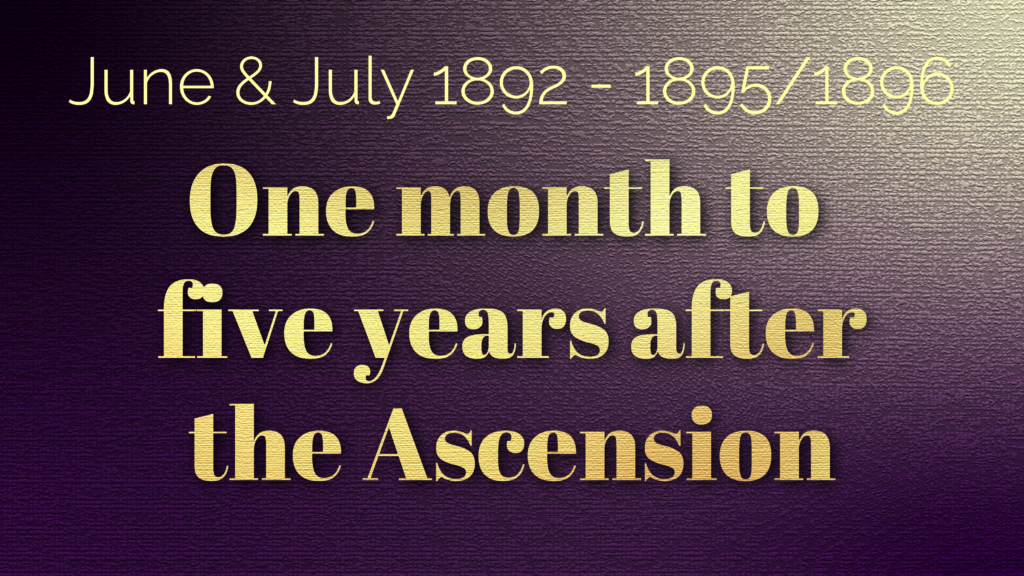
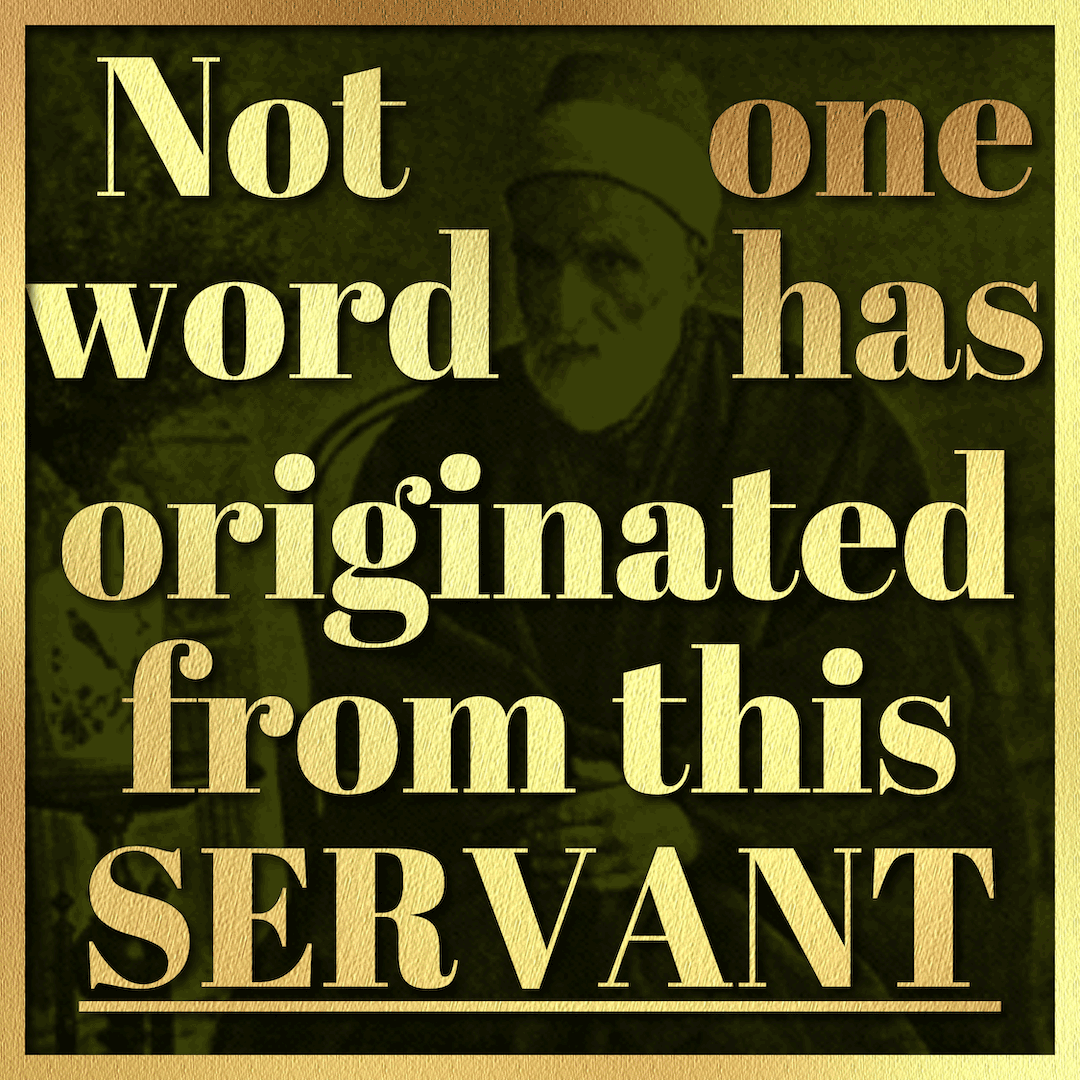
The words of Mírzá Áqá Ján’s confession, overlaid over his photograph. Source: Wikimedia Commons.
Bahá'u'lláh’s Ascension took place shortly after Mírzá Áqá Ján's failure to give Bahá'u'lláh immediate and full credit for all the emanations of His pen, even those written in his voice. After the Ascension, 'Abdu'l-Bahá revisited the matter, and asked Mírzá Áqá Ján to send Ḥájí Mírzá ‘Abdu’lláh the reply he had been waiting for.
Mírzá Áqá Ján wrote a letter in his own hand, dated one month after Bahá'u'lláh’s Ascension in which he unequivocally stated that every single word of every single Tablet of Bahá'u'lláh had been dictated to Him by Bahá'u'lláh Himself: “Not one word has originated from this servant. Every word was revealed from the Kingdom of God—my Lord, yours, and the Lord of all who are in the heavens and on earth. Always, after obtaining permission, I would, in His most holy and exalted presence, read the letters which were addressed to this servant. He would then direct me to take my pen and write the answer which, from the beginning to end, was revealed by His blessed tongue. This practice was not limited to this servant alone. Many times has the Tongue of Grandeur* revealed in the words of His companions or those believers who came from abroad what amounts to a mighty book for all the world...I was only a servant recording His words in His presence…”
Adib Taherzadeh, The Revelation of Bahá'u'lláh Volume 1: Baghdád 1853 - 1863, pages 40-42.
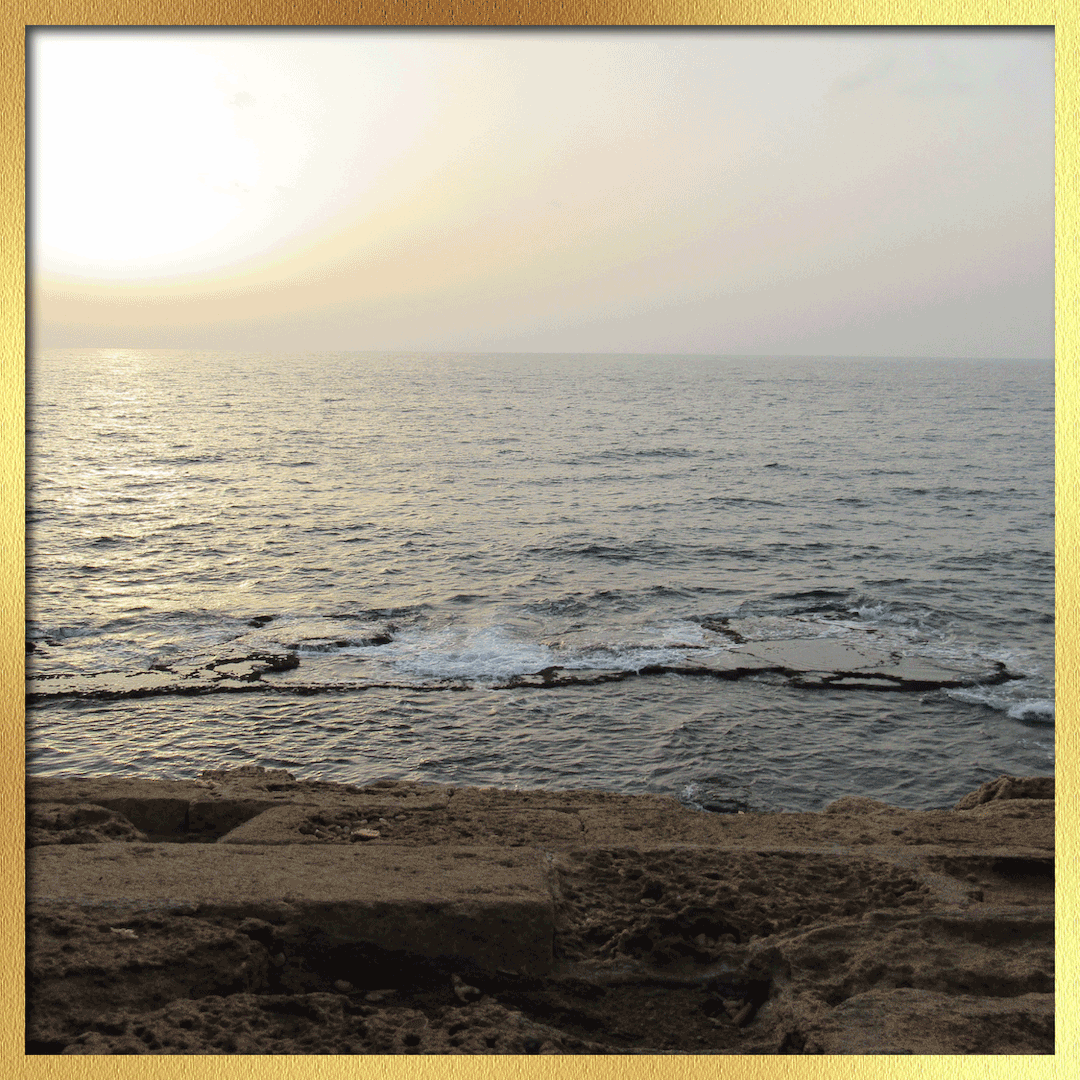
As in this beautiful photograph, the sun had set forever in Nabíl’s life after Bahá'u'lláh’s Ascension. Nabíl had spent decades immersed in the ocean of Bahá'u'lláh’s Writings, and he cast himself into the sea Bahá'u'lláh had gazed at for almost a quarter century. Source: Wikimedia Commons.
Nabíl was inconsolable after the Ascension of Bahá'u'lláh, whom he had served for decades. Add to his insurmountable grief, 'Abdu'l-Bahá’s half-brothers began their Covenant-breaking activities immediately after this devastating blow, and Nabíl could no longer bear the agony he was living.
He took his own life by drowning himself in the Mediterranean almost exactly two months after the Ascension of Bahá'u'lláh.
His suicide note was a single Arabic word, Gharíq (Drowned), the numerical value of which corresponds to both the year Bahá'u'lláh had passed away, and he had died.
‘Abdu’l-Bahá, Memorials of the Faithful.
Shoghi Effendi, God Passes By.
Adib Taherzadeh, The Revelation of Bahá'u'lláh Volume 1: Baghdád 1853 - 1863, pages 205-206.
Adib Taherzadeh, The Revelation of Bahá'u'lláh Volume 4: Mazra’ih and Bahjí 1877-1892, page 419.
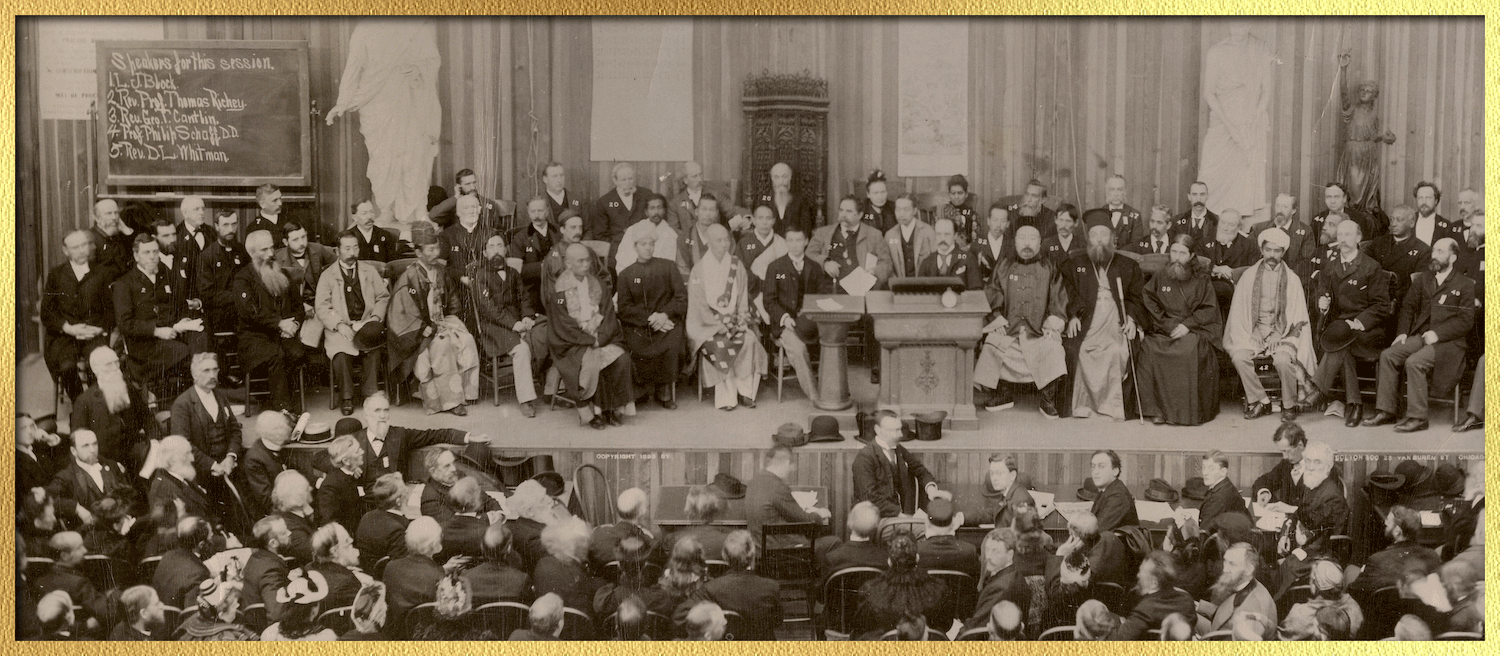
The World's First Religious Parliament in Chicago in 1893, where Bahá'u'lláh's name is first mentioned publicly in the West. Wikipedia Commons.
The World's First Religious Parliament in Chicago in 1893, where Bahá'u'lláh's name is first mentioned publicly in the West. Wikipedia Commons.
The Reverend Henry H. Jessup, Director of Presbyterian Missionary Operations in North Syria, read a paper at the World's Parliament of Religions held in Chicago from 11 to 27 September, making it the first organized interfaith gathering.
The organizers made an attempt to include everyone from a variety of Christian denominations, Jewish and Muslim representations to new Faith movements such as Spiritualists, and included First Nations religious figures, Sikhs, the Theosophical Society, indigenous Chinese religions, Jains, Buddhists, Zen practitioners, and Bramo Saraj.
On 23 September 1893, six days into the conference, the Reverend Jessup announced that “a famous Persian Sage,” “the Bábí Saint,” had recently died in ‘Akká, closing his address by stating he felt moved to read Edward Granville Browne's account of his visit to Bahá'u'lláh a year before His Ascension. Jessup shared the excerpt, he said, because of the “sentiments so noble, so Christ-like” expressed by Bahá'u'lláh in the interview.
Shoghi Effendi, God Passes By.
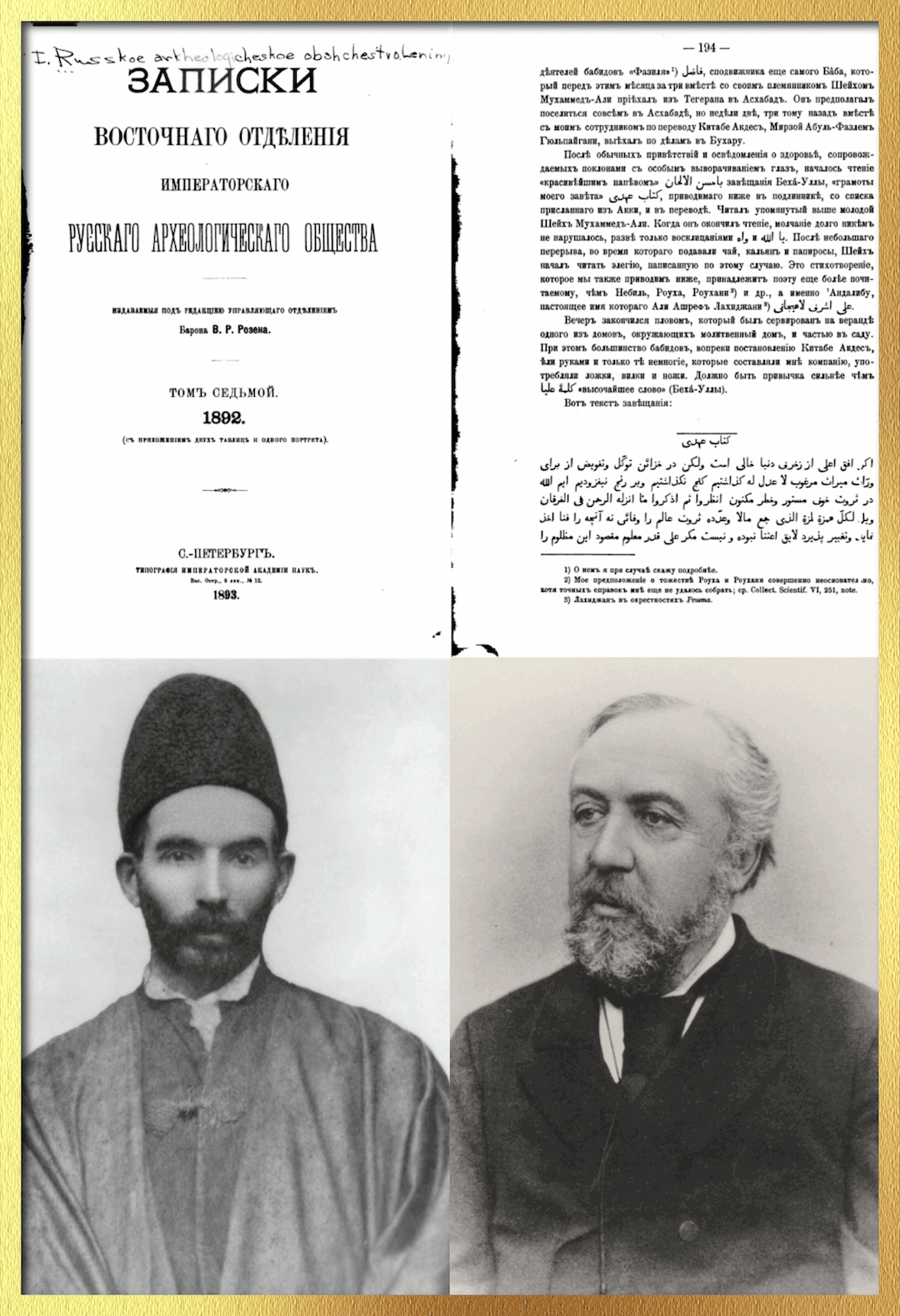
Top left: Scan of the front page of the Russian orientalist journal Memoirs of the Oriental Branch of the Russian Archeological Society in which the Kitáb-i-‘Ahd was published in 1893. Top right: Scan of the first page on which the Kitáb-i-'Ahd appears in Russian with some Persian verses. Source: Scans courtesy of Steve Cooney. Bottom left: 'Andalíb, the celebrated Persian poet whose 31-couplet poem was published in the same Russian journal. Source: Christopher Buck and Youli Ioannesyan, The 1893 Russian Publication of Baha’u’llah’s Last Will and Testament. Bottom right: Baron Viktor Romanovich von Rosen, Russian Orientalist, editor and publisher of the 1893 Russian publication of the Kitáb-i-‘Ahd. Source: Rosensches Familienarchiv, Hamburg, courtesy of Prof. Dr. Claus Freiherr von Rosen, Hamburg.
Aleksandr Grigor’evich Tumanski was a Russian orientalist and Major-General of the Russian Imperial Army from an ancient aristocratic family and fluent in eleven languages including Turkish, Arabic and Persian. He formed strong bonds of friendship with the Bahá'ís of 'Ishqábád in 1889/1890, meeting Mírzá Abu’l-Faḍl, and remaining close to the community until the end of his life.
The devastating news of Bahá'u'lláh’s Ascension reached the Bahá'ís of ‘Ishqábád on 24 June 1892, and Tumanski was invited to a memorial gathering in honor of Bahá'u'lláh, held on the property they had purchased for the House of Worship, in the unfinished building in front of which was a pretty, large pool of water and a newly built garden. The believers said prayers, read the Kitáb-i-‘Ahd aloud, and recited the 31-couplet marthíyih (poem) composed by the celebrated Bahá'í poet ‘Andalíb, who was present in 'Akká during the Ascension, and in which he laments Bahá'u'lláh’s Ascension and praises His greatness.
Shortly after the memorial gathering, on 3 July 1892, Tumanksi wrote a letter to another eminent Russian orientalist, his mentor, Baron Viktor Romanovich von Rosen and enclosed a copy of ‘Andalíb’s poem and the Kitáb-i-‘Ahd. Baron von Rosen translated both documents in Russian and published them in 1893, a year after the Ascension of Bahá'u'lláh, in the Russian orientalist journal ZVORAO, Memoirs of the Oriental Branch of the Russian Archeological Society, the first publication of the Kitáb-i-‘Ahd.
About one year after the Ascension of Bahá'u'lláh, His Will and Testament, the Kitáb-i-‘Ahd, to which Bahá'u'lláh had referred as His "Most Great Tablet," was published in a Russian academic journal.
Christopher Buck and Youli Ioannesyan, The 1893 Russian Publication of Baha’u’llah’s Last Will and Testament: An Academic Attestation of ‘Abdu’l-Baha’s Successorship, published in 2017 in Baha’i Studies Review Volume 19.
With many thanks to Christopher Buck and Youli Ioannesyan for confirming the fact this publication was the first ever of the Kitáb-i-‘Ahd, and for giving us permission to use the stunning photographs from their article.
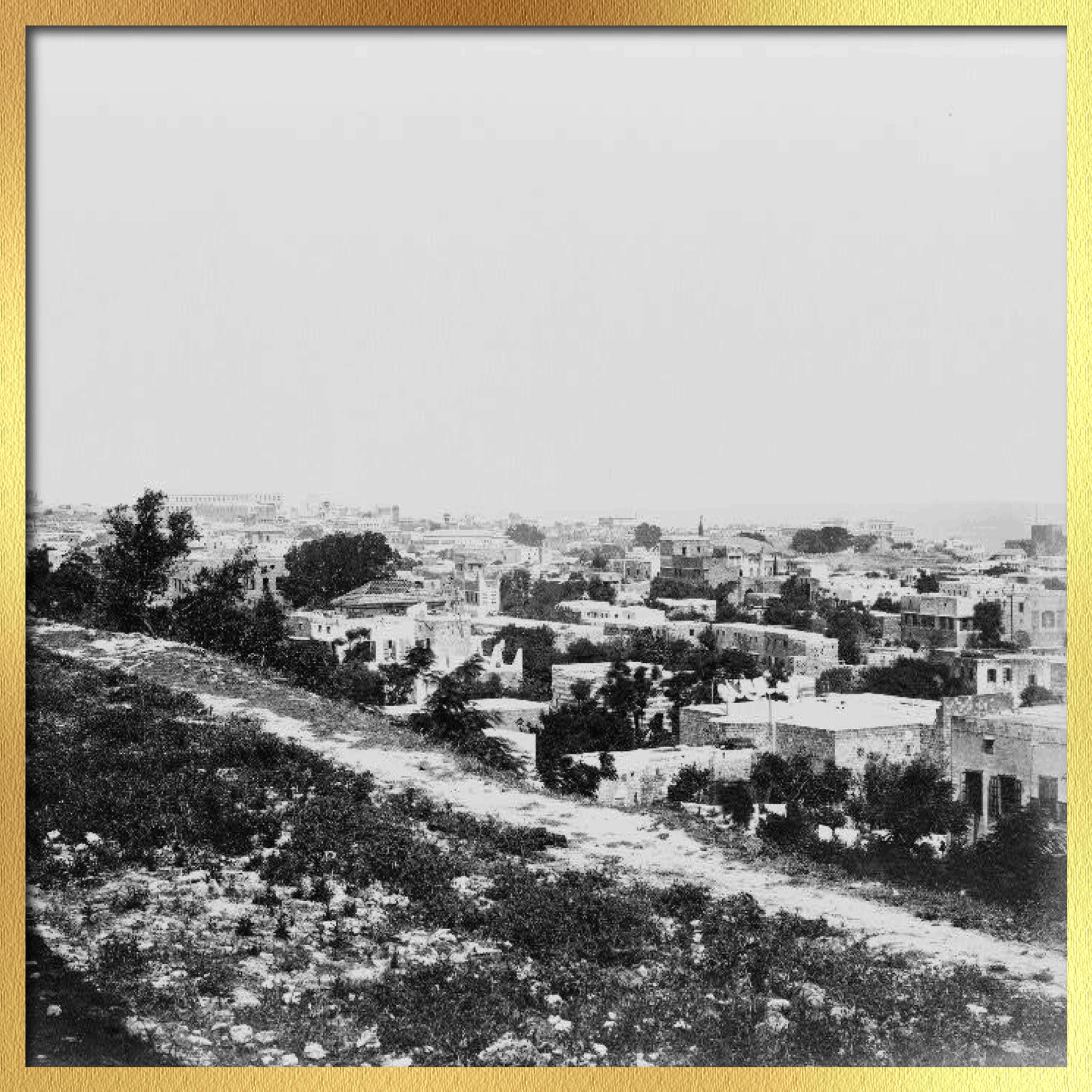
A general view of Beirut, Lebanon, which was considered Syria at the time the story takes place. The photograph was taken sometime between 1860 and 1890. Disclaimer: It is not known if the story took place in Beirut, merely that Ya'qúb-ibn-Betros was Lebanese. Source: Library of Congress.
In 1895/1896 when Mírzá 'Abu’l-Faḍl was living in Syria, Ya'qúb-ibn-Betros, a Lebanese doctor of divinity and linguistics, and well known among the Christian community of 'Akká, composed a poem in praise of the Shrine of Bahá'u'lláh in Bahjí and offered it to 'Abdu'l-Bahá: “Set betwixt the twin mounts of Lebanon and Carmel is the Bahjí, Therein is the resting place of Bahá, the Lord of Bounty and Mercy, The Chosen Master, the Lamp of Guidance, Bahá—the Splendour and the Light of the Sun of Truth, He Who is the Luminary of all names, Therein the true joy, the Desire of all hearts, hearts that seek His lights, The Solace of the eyes, the Fulfilment and Realization of all hope, By His beneficent presence, the water that springs from the wells of those parts was purified (i.e. of 'Akká) and the air and clime of 'Akká and its environs were changed.”
Adib Taherzadeh, The Revelation of Bahá'u'lláh Volume 3: ‘Akká, the Early Years 1868-1877, pages 21-22.
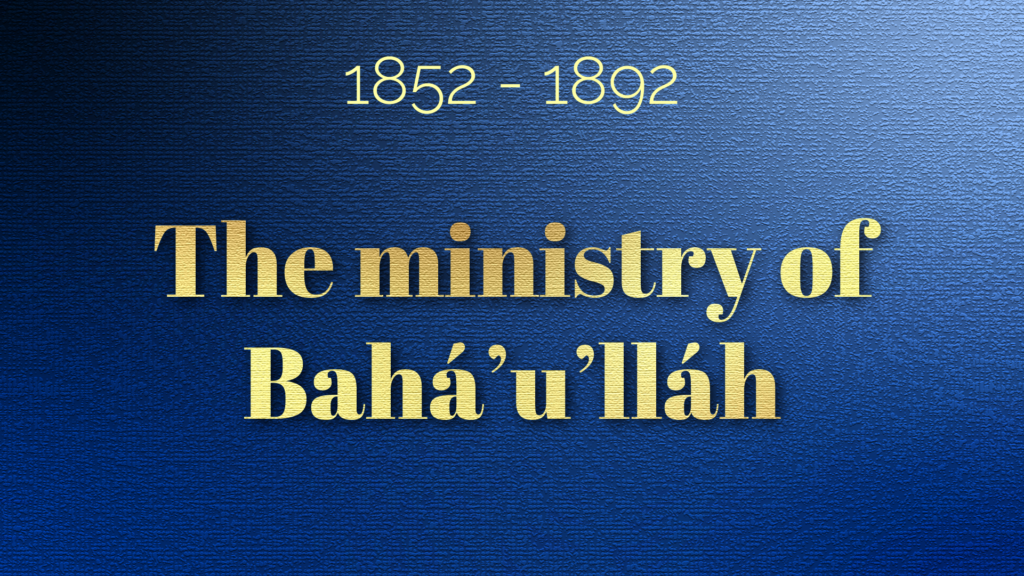
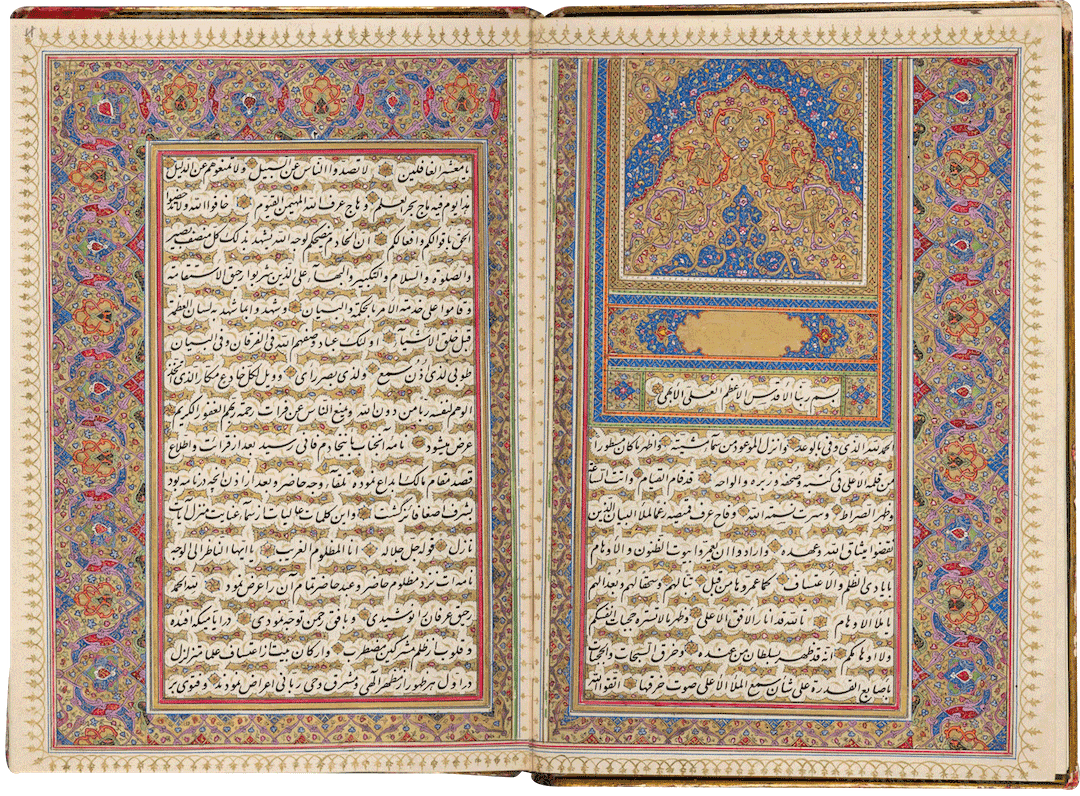
For the concluding image on a double chronology of the life and Revelation of Bahá'u'lláh, we leave you with the most important aspect of the life of any Manifestation of God, and most particularly of Bahá'u'lláh’s life: His Revelation. This stunning specimen of illumination is the frontispiece of the Majmú‘iy-i-Mubárakih (The Blessed Collection), gathering 26 of Bahá'u'lláh’s most important works in an exceptionally decorated volume bound in a exquisite traditional lacquer binding. The calligrapher was Mírzá ‘Ali Akbar Mílání Muhíb al-Sulṭán, who was the manager the Royal Printing Press in Iran. The Tablet featured in the opening page of the Majmú‘iy-i-Mubárakih is an extremely lengthy, 18,700 word Tablet of Bahá'u'lláh that is entirely untranslated and addresses many subjects, among which is a commentary on the Lawḥ-i-Ra’ís, and the martyrdom of Badí’. This extraordinary volume was a gift from 'Abdu'l-Bahá to the British Museum, and was presented to the museum on His behalf by Hippolyte Dreyfus-Barney on 12 April 1913, almost three months after 'Abdu'l-Bahá’s last visit to England. Source for the Tablet: Partial Inventory ID: BH00008. Source for the scan of the Tablet: British Library.
[This blended account describing Bahá'u'lláh’s ministry was composed
from eight separate excerpts in various chapters
of Shoghi Effendi’s God Passes By]
When the Báb declared His mission to Mullá Ḥusayn on 23 May 1844, He set in motion a divinely propelled and world-embracing dynamic process with the power transform the world. That process was accelerated with Bahá'u'lláh’s Revelation in the Siyáh-Chál in October 1852, and reached a climax with His Declaration in the garden of Riḍván in Baghdád, before its full significance was unveiled to the world through Bahá'u'lláh’s Proclamation, which started in Adrianople in 1868 and continued until His summons in the Kitáb-i-Aqdas in 1873, when it was consummated through the formulation of the laws, principles, and institutions enshrined in the Most Holy Book, several of which Bahá'u'lláh instituted in His own lifetime.
The Institution of the Covenant was the divinely ordained instrument, organically linked with Bahá'u'lláh, which was to direct and canalize the monumental spiritual forces let loose by world-embracing dynamic process that was ushered into the world with the birth of the Bahá'í Dispensation. Bahá'u'lláh safeguarded this mighty and precious Covenant before His passing by firmly establishing 'Abdu'l-Bahá as His successor in the Kitáb-i-‘Ahd.
At the time of Bahá'u'lláh’s Ascension, nearly half a century had passed since the birth of the Bábí Revelation, and exactly forty years had elapsed since the birth of the Bahá'í Revelation. When the Bábí community had been reduced to dust after the cruel and sudden martyrdom of the Báb, Bahá'u'lláh had raised it from its ashes, guided to Bábís to the Bahá'í Revelation, and rehabilitated the fortunes of a broken community until it had thrived and prospered under His guiding hand and the revivifying outpour of His uninterrupted Revelation.
Bahá'u'lláh’s Revelation is unparalleled in the annals of religious history both for the magnitude of His Writings and the diversity subjects He expounds upon. Bahá'u'lláh testified to the volume of His revelation saying “The verses which have rained from this Cloud of Divine mercy have been so abundant that none hath yet been able to estimate their number” In terms of the variety of themes one can find in Bahá'u'lláh’s revealed Holy Writings, they include prayers, homilies, orations, Tablets of visitation, scientific treatises, doctrinal dissertations, exhortations, commentaries on the Qur’án and Ḥadíths, epistles to kings and religious leaders, and laws and ordinances.
With the Ascension of Bahá’u’lláh, the second epoch of the Heroic Age of the Faith drew to a close, and the Message proclaimed by the Báb had yielded its precious fruit. The Sun of Truth had risen from the dark depths of the Siyáh-Chál, had broken through the clouds of Baghdád, climbed to its zenith in Adrianople, and it had finally set in 'Akká, never again to rise until the lapse of a full millennium. Divine Revelation was ended.
All of the kings, ministers, princes, and religious leaders who either directly opposed the Faith of Bahá’u’lláh, failed to respond to His call, to inquire into His Message, to avert the His sufferings, or to heed the marvelous prophecies of His Advent, felt the full force of God’s retributive justice. Bahá'u'lláh had prophesied “From two ranks amongst men power hath been seized: kings and ecclesiastics.” Speaking about the tyrannical kings of the earth, He stated “in this Revelation hath He [God] visited each and every tyrant with His vengeance,” and regarding the world’s religious leaders, Bahá'u'lláh had these stern words: “The source and origin of tyranny have been the divines.”
The newborn Bahá'í Revelation had fulfilled all the prophecies regarding its advent. It’s fundamental laws, those which would form the warp and woof of the fabric of the New World Order, had been clearly enunciated, and its embryonic institutions established. Its Covenant had been safeguarded for posterity, and Bahá'u'lláh had promised world peace and the unification of the human race, and entered into the Third Epoch of the Heroic Age, firmly guided and encouraged by 'Abdu'l-Bahá, the Center of the Covenant.
This blended account describing Bahá'u'lláh’s ministry was composed using exclusively Shoghi Effendi’s words from various chapters of God Passes By:
Shoghi Effendi, God Passes By, "Well-nigh half a century had passed...".
Shoghi Effendi, God Passes By, “With the ascension of Bahá’u’lláh…”
Shoghi Effendi, God Passes By, “In the vastness and diversity of its Holy Writ…”
Shoghi Effendi, God Passes By, “To the fate that has overtaken those kings…”
Shoghi Effendi, God Passes By, “A dynamic process, divinely propelled…”
Shoghi Effendi, God Passes By, “To direct and canalize these forces let loose…”
Shoghi Effendi, God Passes By, “in the magnitude of the writings…”
